Security Alert May 17, 2024
Worldwide caution, update may 10, 2024, information for u.s. citizens in the middle east.
- Travel Advisories |
- Contact Us |
- MyTravelGov |

Find U.S. Embassies & Consulates
Travel.state.gov, congressional liaison, special issuance agency, u.s. passports, international travel, intercountry adoption, international parental child abduction, records and authentications, popular links, travel advisories, mytravelgov, stay connected, legal resources, legal information, info for u.s. law enforcement, replace or certify documents.
Share this page:
Belgium Travel Advisory
Travel advisory july 26, 2023, belgium - level 2: exercise increased caution.
Reissued with obsolete COVID-19 page links removed.
Exercise increased caution in Belgium due to terrorism.
Country Summary : Terrorist groups continue plotting possible attacks in Belgium. Terrorists may attack with little or no warning, targeting tourist locations, transportation hubs, markets/shopping malls, local government facilities, hotels, clubs, restaurants, places of worship, parks, major sporting, music, and cultural events, educational institutions, airports, and other public areas.
Read the country information page for additional information on travel to Belgium.
If you decide to travel to Belgium:
- Be aware of your surroundings when traveling to tourist locations and crowded public venues.
- Monitor local media for breaking events and be prepared to adjust your plans.
- Enroll in the Smart Traveler Enrollment Program ( STEP ) to receive Alerts and make it easier to locate you in an emergency.
- Follow the Department of State on Facebook and Twitter .
- Review the Country Security Report for Belgium.
- Visit the CDC page for the latest Travel Health Information related to your travel.
- Prepare a contingency plan for emergency situations. Review the Traveler’s Checklist .
Travel Advisory Levels
Assistance for u.s. citizens, belgium map, search for travel advisories, external link.
You are about to leave travel.state.gov for an external website that is not maintained by the U.S. Department of State.
Links to external websites are provided as a convenience and should not be construed as an endorsement by the U.S. Department of State of the views or products contained therein. If you wish to remain on travel.state.gov, click the "cancel" message.
You are about to visit:
14 things you need to know about Belgium for a perfect trip

May 21, 2022 • 6 min read
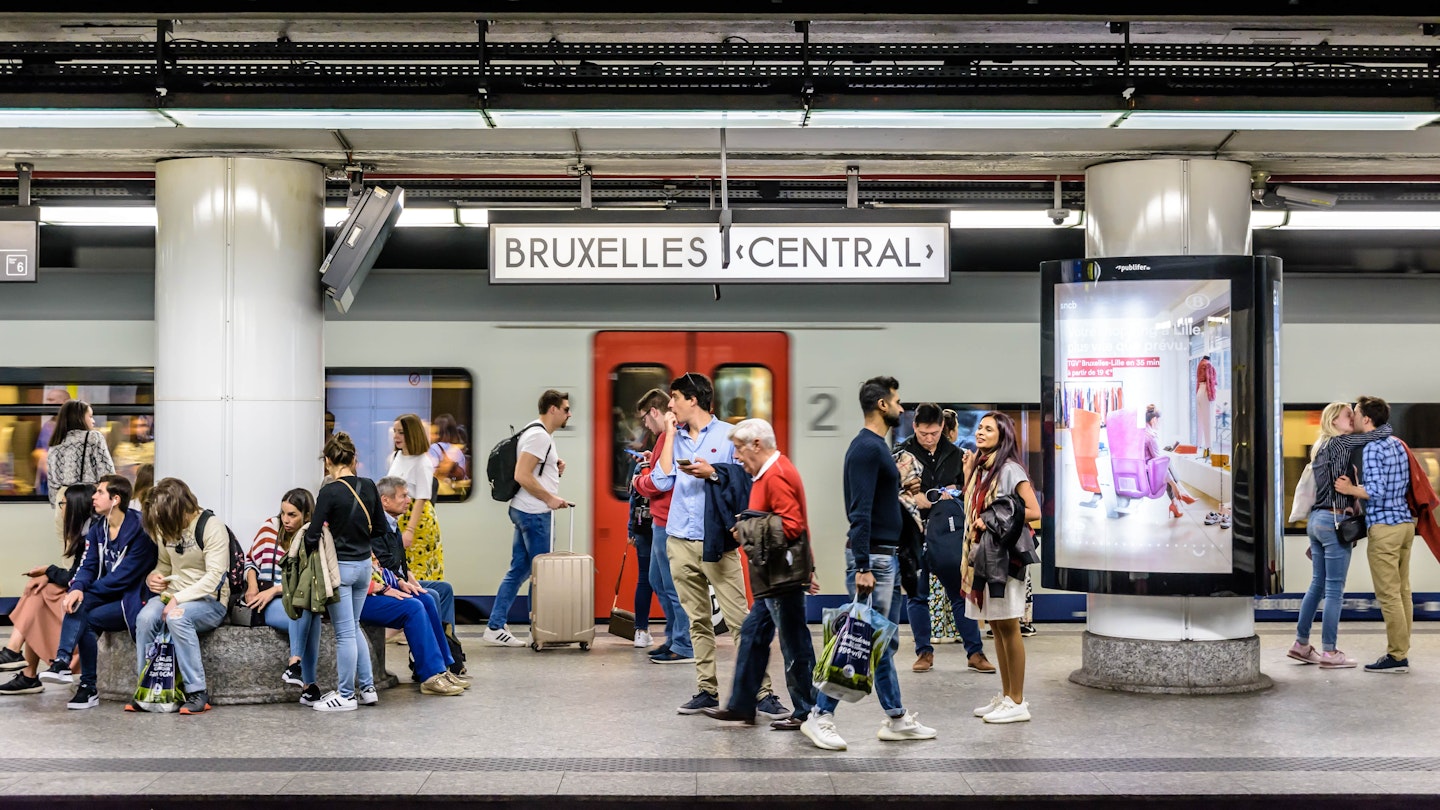
With a few tips, it's easy to navigate Belgium's historic cities and calm countryside © olrat / Shutterstock
Despite being one of the smallest countries in Europe, Belgium has a lot to offer travelers – medieval castles, modern architecture, a world-renowned fashion scene, great food, and more than 1000 brands of beer – really!
Belgium also has not one, but three official languages. Luckily, more than half of Belgians speak English, so it’s easy to get around – just be aware of the monolingual road signage (the language will depend on where in Belgium you are). Here are our top tips to help you make the most of a trip to Belgium.
1. Pack a raincoat
Influenced by the weather systems of the North Sea and the Atlantic Ocean, Belgium has a temperate maritime climate characterized by frequent precipitation and heavy cloud cover. The temperature rarely climbs above 22°C (72°F) in the summer, and thunderstorms are frequent – so you’ll want to pack rain gear, regardless of what time of year you visit.
2. Make the most of your trip by traveling around
There’s so much to see in Belgium, and it’s easy to travel from one place to the next by car or train, so we recommend splitting your time between several destinations. Get lost in the atmospheric streets of Bruges , hit the museums and fashion boutiques in Antwerp , lace up your hiking boots in Hoge Kempen National Park – the country’s only national park – and visit the UNESCO World Heritage-listed Grand Place in Brussels . Most cities are within a few hours of one another, making it easy to cover a lot of ground in a short period of time.
3. Bring pocket change in case you need to spend a penny
In Belgium, free public restrooms are virtually non-existent. Most public facilities charge and few accept credit cards, so you’ll want to carry loose some euros and cents in change. Expect to pay around €0.50 (US$0.54) per visit – get into the habit of using the washroom before leaving the hotel or restaurant.
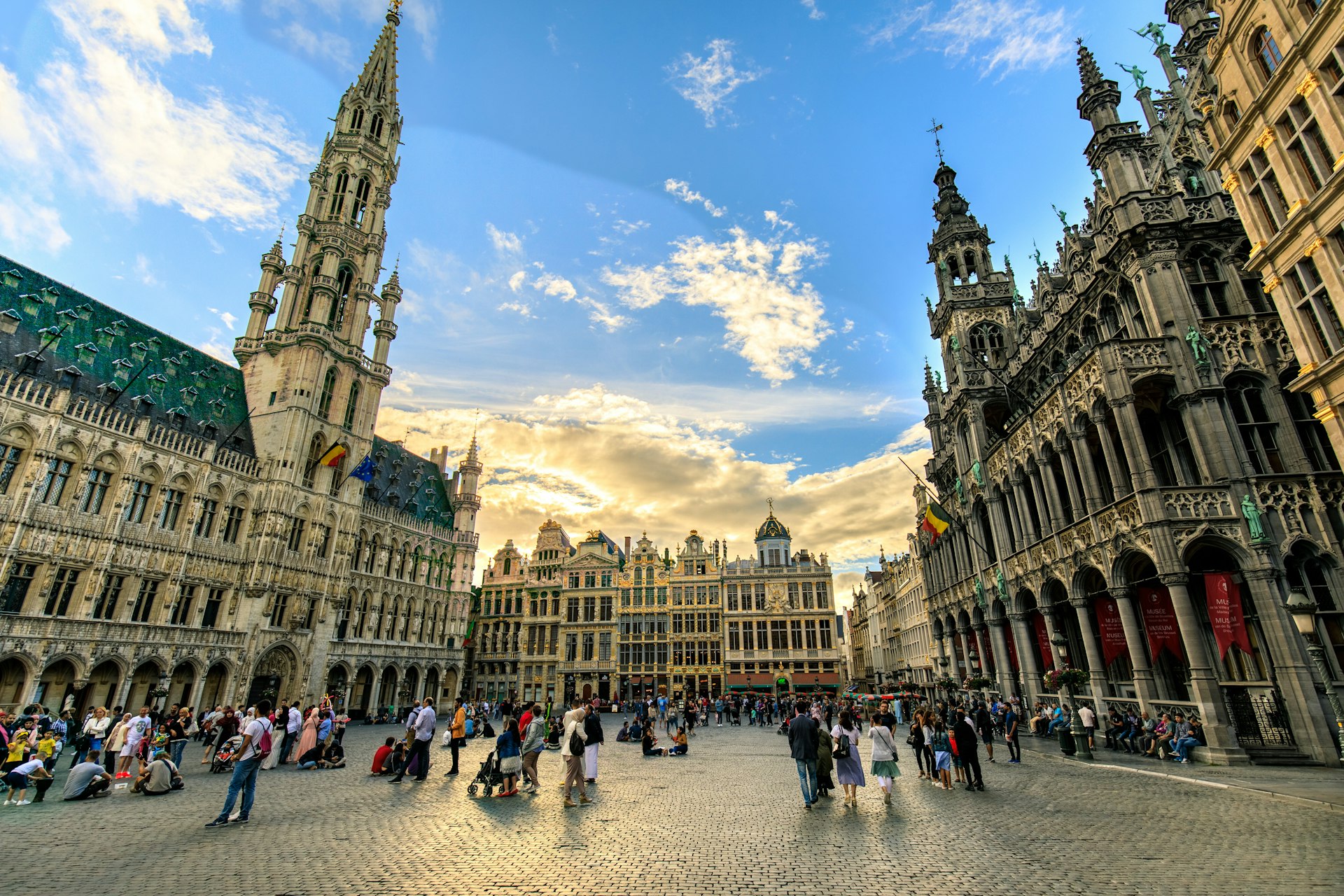
4. Swap taxis for public transport when you arrive in Brussels
Taxis in Brussels are among the most expensive in Europe – a cab ride between Brussels Airport and the city center will cost at least €3 (US$3.30) per km. While we won’t judge for splurging after a long-haul flight, the city’s excellent bus, tram and metro system will take you almost anywhere you need to go from 6am to midnight, seven days a week, including into town from the airport (for as little as €7/US$7.35 in total). For cheap, low-carbon transport, consider renting a bike through a bike-sharing platform, such as Villo! .
5. Don't rush to rent a car
Belgium is car-friendly in many ways – you can drive from one end of the country to the other in a matter of hours, and nearly all the country’s motorways are fully lit at night. It’s also super easy to rent a car on the fly, thanks to car-sharing apps such as Poppy and Cambio .
At the same time, driving in Belgium can be quite an undertaking. Signage is mostly monolingual, and the names of places depend on which language is spoken. For example, the German border city of Aachen might appear on Belgian signs as Aix-la-Chapelle, the Flemish city of Ghent is also Gand, and Liège is also Lîdje, Luik and Lüttich.
6. When in doubt, speak English
Belgium has three official languages: Dutch, French and German. Dutch (specifically, the Flemish dialect) is primarily spoken in Flanders in the north, while French is mostly spoken in the southern region of Wallonia, and German is the default in eastern regions of the province of Liège. Brussels (also known as Brussel and Bruxelles) is officially bilingual, speaking Dutch and French.
With language at the center of Belgium's knotty cultural identity debate, it's best to speak English if you’re unsure of the dominant tongue wherever you happen to be. You’ll likely find that most people, especially in big cities such as Antwerp and Brussels, speak flawless English anyway.
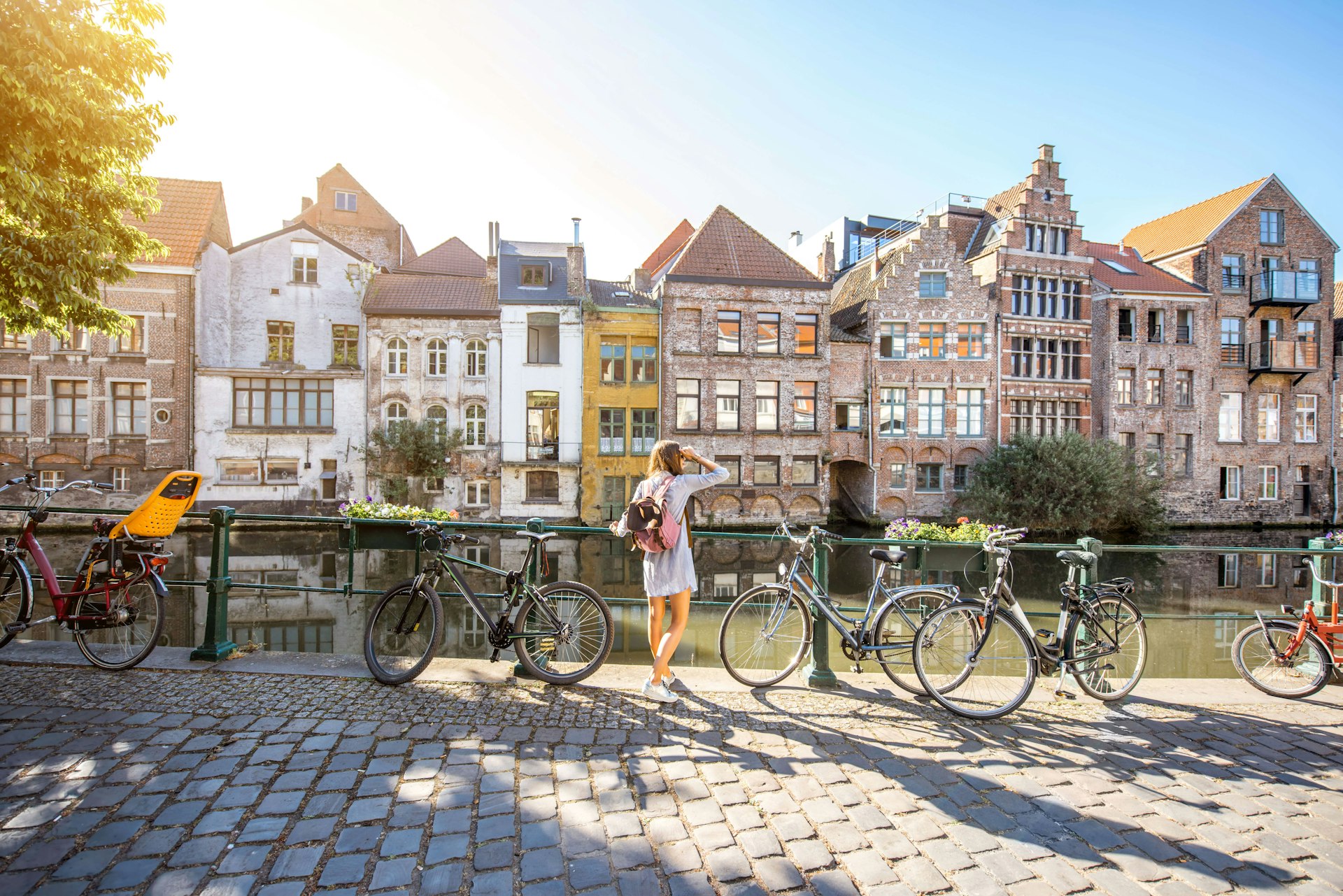
7. Recycle like a Belgian
Belgians take recycling very seriously. In fact, the country boasts the highest recycling rate for household packaging in all of Europe (an impressive 94.9%). While you should always take care to recycle and reduce when you’re on the road away from home, you’ll want to be especially mindful of this when traveling through Belgium.
8. There’s no need to tip in Belgium
Tipping in Belgium isn’t a standard practice, nor is it expected, as most service staff are paid a fair living wage. Furthermore, most restaurants automatically include a 10–15% tip in the bill. If you think the service was excellent and want to leave more, you can always leave a few euros on the table after your meal.
9. Extend a hand in greeting
How do you greet people in Belgium? It depends on where you are. Most people in Brussels prefer a handshake, while most folks in French-speaking Wallonia will turn a cheek for a kiss. To play it safe in these Covid-aware times, we recommend extending a hand to test the waters.
10. Don’t leave your shopping for Sunday
If you need to stock up at the supermarket or buy souvenirs, don’t plan on doing it on a Sunday. As most Belgians are Roman Catholic, many shops are closed on Sundays, including major grocery stores and banks.
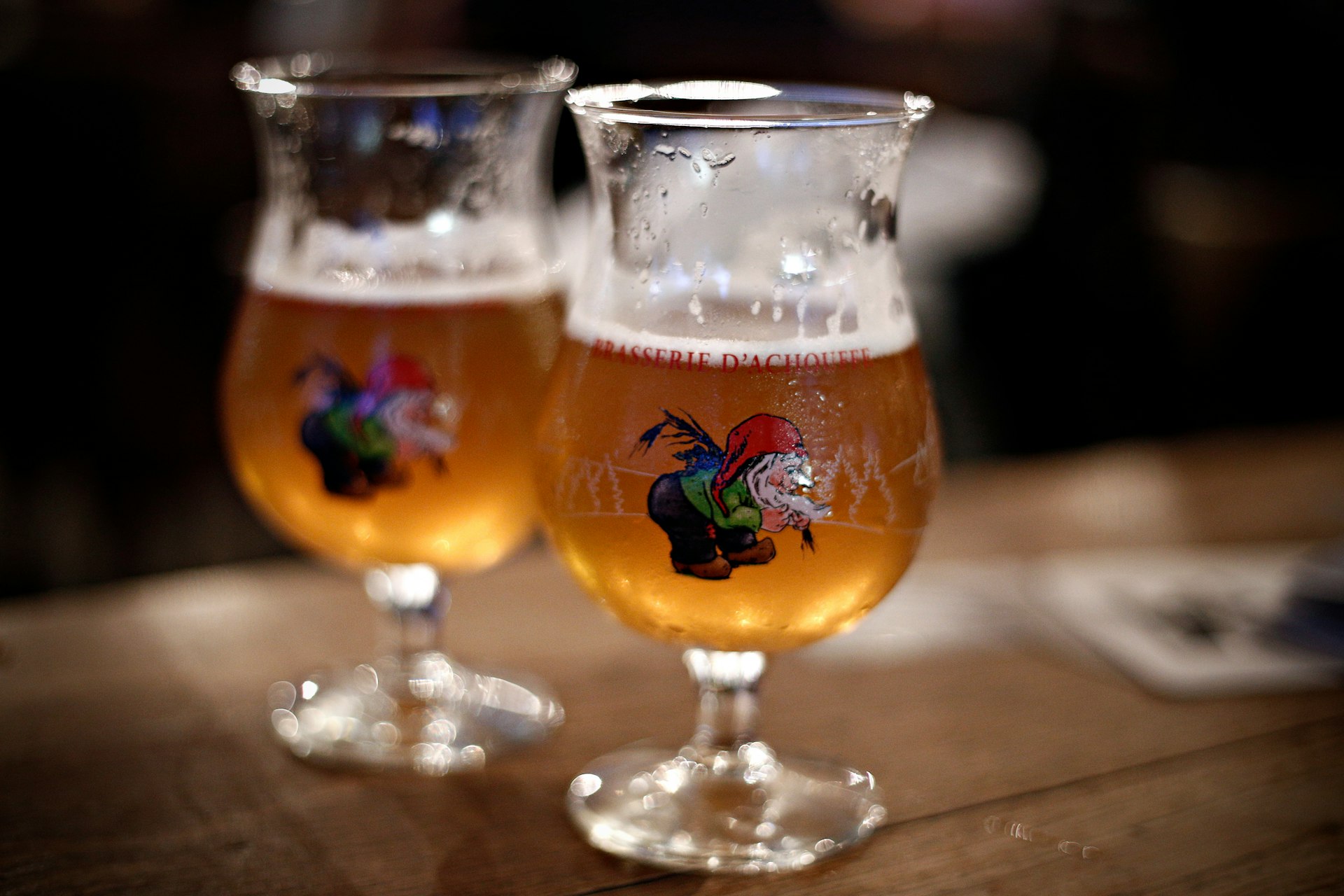
11. Drink beer, lots of lovely beer
Belgium is home to over 300 breweries and more than 1000 types of Belgian beer . So, it’s practically a requirement to imbibe while you’re there (and honestly, you might be judged if you order a glass of vino instead of a homegrown brew at the local pub). Try everything from pilsners and witbier to Trappist ales and naturally fermented lambics.
Oh, and don’t expect to chug your Duvel out of any old glass. Belgians love their glassware, and you'll find a dizzying array of options, from tulips and flutes to goblets and tankards.
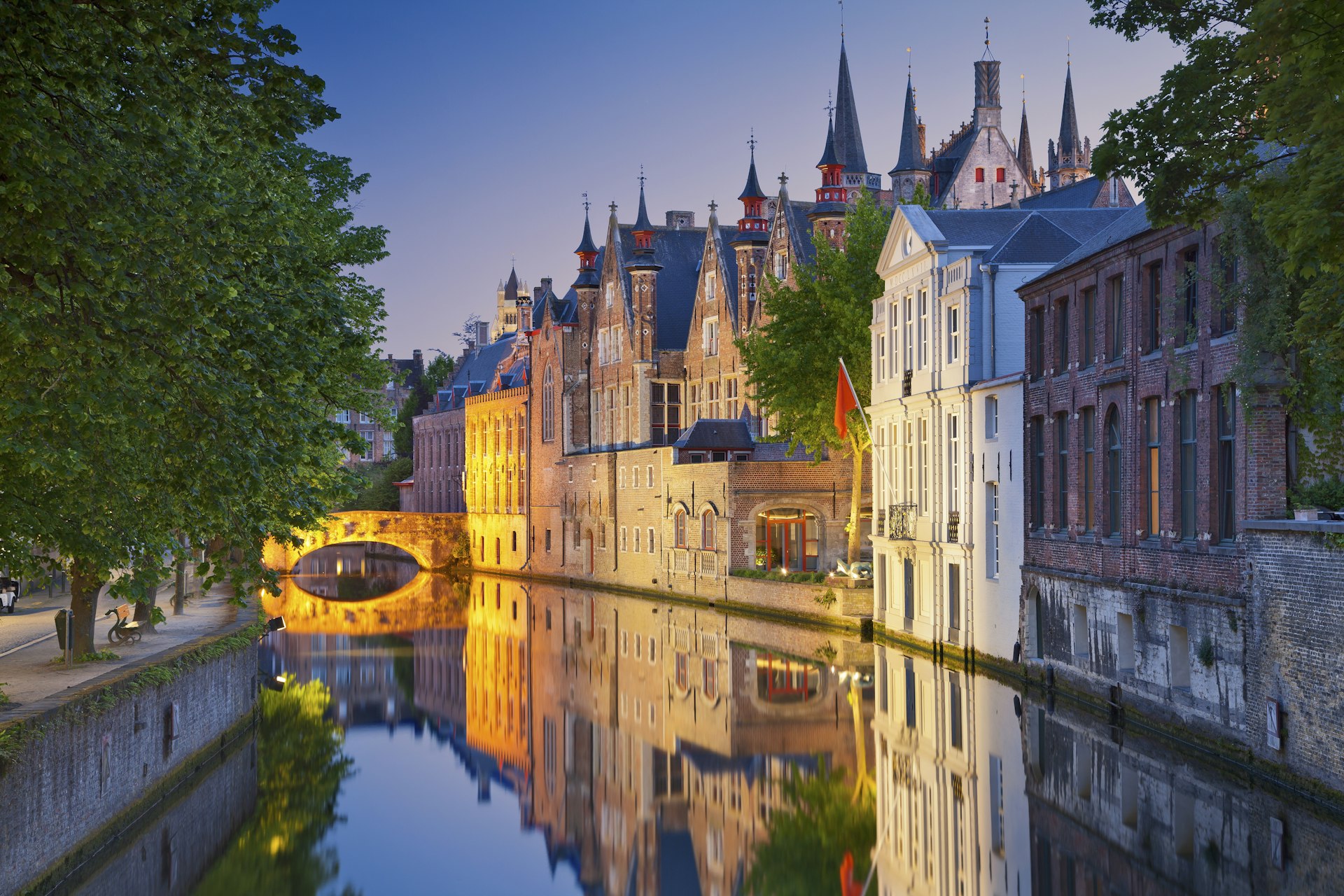
12. Can you drink tap water in Belgium?
Yes, you certainly can. Some even say the tap water is even better than the bottled mineral kind you get in the supermarket (bring a water bottle to save on plastic).
13. You can feel safe about being yourself
In 2003, Belgium became the second country in the world to legalize same-sex marriage, and the country’s long-held progressive values and vibrant nightlife make it a top destination for LGBTIQ+ travelers. Brussels has long been the center of the scene – the city’s La Demence event draws partiers from all over the world 12 times a year – but even smaller towns such as Bruges and Ghent are getting in on the action.
14. Have fun – but be cautious of petty crime
Generally speaking, Belgium is a safe country with relatively low crime rates. For most travelers, the biggest risk is pickpocketing and bag-snatching in crowded areas. However, in recent years, there has been a rise in terrorist attacks across Belgium – travelers should exercise vigilance, particularly in Brussels, where international organizations, including NATO and the EU, are headquartered.
Explore related stories

Destination Practicalities
May 23, 2024 • 5 min read
Choose the right time for your visit to Belgium with this seasonal breakdown.

May 22, 2024 • 6 min read

May 14, 2024 • 7 min read

May 5, 2024 • 8 min read
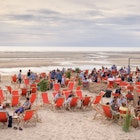
Apr 19, 2024 • 8 min read

Feb 9, 2024 • 12 min read
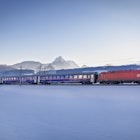
Dec 19, 2023 • 6 min read
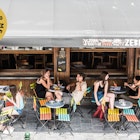
Sep 19, 2023 • 4 min read

Aug 16, 2023 • 7 min read

May 18, 2023 • 6 min read
- Skip to main content
- Skip to "About this site"
Language selection
Search travel.gc.ca.
Help us to improve our website. Take our survey !
COVID-19: travel health notice for all travellers
Belgium travel advice
Latest updates: The Health section was updated - travel health information (Public Health Agency of Canada)
Last updated: May 6, 2024 10:24 ET
On this page
Safety and security, entry and exit requirements, laws and culture, natural disasters and climate, belgium - exercise a high degree of caution.
Exercise a high degree of caution in Belgium due to the threat of terrorism.
Back to top
Increase in drug-related violence
There has been an increase in violence, including stabbings and shootings, linked to the drug trade in Brussels and other major cities.
In February 2024, shootings have occurred in the commune of Brussels, in the Marolles neighbourhood, and around the following locations in the commune Saint-Gilles:
- Port-de-Hal
- Gare du Midi
- Place Jacques Franck
If you are in Brussels:
- be aware of your surroundings
- follow the instructions of local authorities
- expect a heightened police presence in certain areas
Petty crime
Petty crime, such as pickpocketing and purse snatching, occurs, particularly in major cities, at popular tourist sites such as the Grand-Place (Grote Markt) in Brussels.
Pickpockets also target passengers in transportation hubs such as:
- train stations
Incidents of petty crime on trains along the Paris–Brussels–Amsterdam and Brussels–London routes are frequent, as well as at the following train stations:
- Gare de Bruxelles-Nord (Noordstation)
- Gare de Bruxelles-Centrale (Centraalstation)
- Gare de Bruxelles-Midi (Zuidstation)
While in Belgium:
- ensure that your belongings, including your passport and other travel documents, are secure at all times, particularly on public transportation
- take extra precautions on trains, as criminals often steal carry-on luggage from overhead compartments or from below seats
- never leave your luggage unattended
- keep car windows and doors locked at all times
- don’t leave any valuables in plain sight inside of vehicles
- be cautious of distraction tactics employed by criminals, such as spilling drinks, engaging you in lengthy conversations, posing odd questions, or offering to assist you unprompted
Violent crime
Violent crime is uncommon. However, incidents have been on the rise. Armed robbers and organized gangs have targeted jewellers, banks and individuals carrying cash and valuables.
- Don’t carry large amounts of cash
- Use caution when using ATMs, especially after dark
Organized gangs use the ports in the North of the country to conduct criminal activities such as smuggling, notably the trafficking of illicit drugs. This is particularly prevalent at the North Sea ports of Ostend and Antwerp. Clashes between rival gangs have lead to violent incidents in Antwerp and its suburbs, including explosive attacks and shootings. Always be aware of your surroundings.
Credit card and ATM fraud occurs. When using debit or credit cards:
- pay careful attention when your cards are being handled by others, and don’t let servers or merchants take your card out of sight
- use ATMs located in public areas or inside a bank or business
- check ATMs or other machines for skimmers or removable readers, and avoid using card readers with an irregular or unusual feature
- cover the keypad with one hand when entering your PIN
- check for any unauthorized transactions on your account statements
Overseas fraud
There is a threat of terrorism in Europe. Terrorists have carried out attacks in several European cities.
In Belgium, separate attacks causing multiple deaths and injuries have taken place. Further attacks in Belgium cannot be ruled out. Further attacks elsewhere in Europe are also likely.
Targets could include:
- government buildings, including schools
- places of worship
- airports and other transportation hubs and networks
- public areas such as tourist attractions, restaurants, bars, coffee shops, shopping centres, markets, hotels and other sites frequented by foreigners
Always be aware of your surroundings when in public places. Be particularly vigilant if attending sporting events, and during religious holidays and other public celebrations, as terrorists have used such occasions to mount attacks.
Enhanced security measures
Following a shooting in Brussels in October 2023, the national threat level increased to level 3 on a scale of 4.
Expect heightened security measures, including:
- an increased police presence across the country
- increased caution and scrutiny from security forces
- potential added security measures in certain places
Public alert system
The Government of Belgium maintains a public alert system on terrorism and communicates threat level changes online and through local media and social media.
Useful links
- Register with the Belgian Public Alert System (BE-Alert) - Belgian Crisis Centre
- Current terrorism threat levels - Belgian Crisis Centre
- @CrisiscenterBE - Belgian Crisis Centre (in French)
Demonstrations
Demonstrations take place frequently, especially in Brussels in the city centre and the European Quarter. Even peaceful demonstrations can turn violent at any time. They can also lead to disruptions to traffic and public transportation.
- Avoid areas where demonstrations and large gatherings are taking place
- Follow the instructions of local authorities
- Monitor local media for information on ongoing demonstrations
Mass gatherings (large-scale events)
Road safety
Road conditions and road safety are very good throughout the country.
The “priority to the right” system is in effect in Belgium. Drivers must give way to vehicles approaching from the right at intersections. This is often a surprise to foreign drivers and results in accidents.
Familiarize yourself with the “priority to the right” system.
We do not make assessments on the compliance of foreign domestic airlines with international safety standards.
Information about foreign domestic airlines
Every country or territory decides who can enter or exit through its borders. The Government of Canada cannot intervene on your behalf if you do not meet your destination’s entry or exit requirements.
We have obtained the information on this page from the Belgian authorities. It can, however, change at any time.
Verify this information with the Foreign Representatives in Canada .
- Schengen area
Belgium is a Schengen area country. Canadian citizens do not need a visa for travel to countries within the Schengen area. However, visa-free travel only applies to stays of up to 90 days in any 180-day period. Stays are cumulative and include visits to any Schengen area country.
If you plan to stay in the Schengen area for a longer period of time, you will need a visa. You must contact the high commission or embassy of the country or countries you are travelling to and obtain the appropriate visa(s) prior to travel.
- Foreign Representatives in Canada
Entry requirements vary depending on the type of passport you use for travel.
Before you travel, check with your transportation company about passport requirements. Its rules on passport validity may be more stringent than the country’s entry rules.
Regular Canadian passport
Your passport must be valid for at least 3 months beyond the date you expect to leave the Schengen area.
Passport for official travel
Different entry rules may apply.
Official travel
Passport with “X” gender identifier
While the Government of Canada issues passports with an “X” gender identifier, it cannot guarantee your entry or transit through other countries. You might face entry restrictions in countries that do not recognize the “X” gender identifier. Before you leave, check with the closest foreign representative for your destination.
Other travel documents
Different entry rules may apply when travelling with a temporary passport or an emergency travel document. Before you leave, check with the closest foreign representative for your destination.
- Foreign Representatives in Canada
- Canadian passports
Tourist visa: not required for stays up to 90 days in any 180-day period Business visa: not required for stays up to 90 days Student visa: not required for stays up to 90 days Work visa: required
Other requirements
Customs officials may ask you to show them a return or onward ticket and proof of sufficient funds to cover your stay.
Travel health insurance
When arriving in Belgium, visitors must show proof of travel health insurance covering the possible costs medical evacuation and emergency medical care.
The insurance must be valid throughout the territory of the Schengen States for the duration of the intended stay or transit. The minimum coverage is 30,000 euros.
Letter of support
If you plan to stay in private accommodations, you must show an invitation with proof of address or a letter of support from a local guarantor.
This letter of support must be issued prior to the date of travel.
Letters of support - Office des étrangers, Government of Belgium (In French)
Yellow fever
Learn about potential entry requirements related to yellow fever (vaccines section).
Children and travel
Learn more about travelling with children .
Relevant Travel Health Notices
- Global Measles Notice - 13 March, 2024
- COVID-19 and International Travel - 13 March, 2024
This section contains information on possible health risks and restrictions regularly found or ongoing in the destination. Follow this advice to lower your risk of becoming ill while travelling. Not all risks are listed below.
Consult a health care professional or visit a travel health clinic preferably 6 weeks before you travel to get personalized health advice and recommendations.
Routine vaccines
Be sure that your routine vaccinations , as per your province or territory , are up-to-date before travelling, regardless of your destination.
Some of these vaccinations include measles-mumps-rubella (MMR), diphtheria, tetanus, pertussis, polio, varicella (chickenpox), influenza and others.
Pre-travel vaccines and medications
You may be at risk for preventable diseases while travelling in this destination. Talk to a travel health professional about which medications or vaccines may be right for you, based on your destination and itinerary.
Yellow fever is a disease caused by a flavivirus from the bite of an infected mosquito.
Travellers get vaccinated either because it is required to enter a country or because it is recommended for their protection.
- There is no risk of yellow fever in this country.
Country Entry Requirement*
- Proof of vaccination is not required to enter this country.
Recommendation
- Vaccination is not recommended.
* It is important to note that country entry requirements may not reflect your risk of yellow fever at your destination. It is recommended that you contact the nearest diplomatic or consular office of the destination(s) you will be visiting to verify any additional entry requirements.
About Yellow Fever
Yellow Fever Vaccination Centres in Canada
Hepatitis B is a risk in every destination. It is a viral liver disease that is easily transmitted from one person to another through exposure to blood and body fluids containing the hepatitis B virus. Travellers who may be exposed to blood or other bodily fluids (e.g., through sexual contact, medical treatment, sharing needles, tattooing, acupuncture or occupational exposure) are at higher risk of getting hepatitis B.
Hepatitis B vaccination is recommended for all travellers. Prevent hepatitis B infection by practicing safe sex, only using new and sterile drug equipment, and only getting tattoos and piercings in settings that follow public health regulations and standards.
Measles is a highly contagious viral disease. It can spread quickly from person to person by direct contact and through droplets in the air.
Anyone who is not protected against measles is at risk of being infected with it when travelling internationally.
Regardless of where you are going, talk to a health care professional before travelling to make sure you are fully protected against measles.
Coronavirus disease (COVID-19) is an infectious viral disease. It can spread from person to person by direct contact and through droplets in the air.
It is recommended that all eligible travellers complete a COVID-19 vaccine series along with any additional recommended doses in Canada before travelling. Evidence shows that vaccines are very effective at preventing severe illness, hospitalization and death from COVID-19. While vaccination provides better protection against serious illness, you may still be at risk of infection from the virus that causes COVID-19. Anyone who has not completed a vaccine series is at increased risk of being infected with the virus that causes COVID-19 and is at greater risk for severe disease when travelling internationally.
Before travelling, verify your destination’s COVID-19 vaccination entry/exit requirements. Regardless of where you are going, talk to a health care professional before travelling to make sure you are adequately protected against COVID-19.
The best way to protect yourself from seasonal influenza (flu) is to get vaccinated every year. Get the flu shot at least 2 weeks before travelling.
The flu occurs worldwide.
- In the Northern Hemisphere, the flu season usually runs from November to April.
- In the Southern Hemisphere, the flu season usually runs between April and October.
- In the tropics, there is flu activity year round.
The flu vaccine available in one hemisphere may only offer partial protection against the flu in the other hemisphere.
The flu virus spreads from person to person when they cough or sneeze or by touching objects and surfaces that have been contaminated with the virus. Clean your hands often and wear a mask if you have a fever or respiratory symptoms.
In this destination, rabies may be present in some wildlife species, including bats. Rabies is a deadly disease that spreads to humans primarily through bites or scratches from an infected animal.
If you are bitten or scratched by an animal while travelling, immediately wash the wound with soap and clean water and see a health care professional.
Before travel, discuss rabies vaccination with a health care professional. It may be recommended for travellers who will be working directly with wildlife.
Tick-borne encephalitis (TBE) is a risk in some areas of this destination. It is a viral disease that affects the central nervous system (brain and spinal cord). It is spread to humans by the bite of infected ticks or occasionally when unpasteurized milk products are consumed.
Travellers to areas where TBE is found may be at higher risk during April to November, and the risk is highest for people who hike or camp in forested areas.
Protect yourself from tick bites . The vaccine is not available in Canada. It may be available in the destination you are travelling to.
Safe food and water precautions
Many illnesses can be caused by eating food or drinking beverages contaminated by bacteria, parasites, toxins, or viruses, or by swimming or bathing in contaminated water.
- Learn more about food and water precautions to take to avoid getting sick by visiting our eat and drink safely abroad page. Remember: Boil it, cook it, peel it, or leave it!
- Avoid getting water into your eyes, mouth or nose when swimming or participating in activities in freshwater (streams, canals, lakes), particularly after flooding or heavy rain. Water may look clean but could still be polluted or contaminated.
- Avoid inhaling or swallowing water while bathing, showering, or swimming in pools or hot tubs.
Insect bite prevention
Many diseases are spread by the bites of infected insects such as mosquitoes, ticks, fleas or flies. When travelling to areas where infected insects may be present:
- Use insect repellent (bug spray) on exposed skin
- Cover up with light-coloured, loose clothes made of tightly woven materials such as nylon or polyester
- Minimize exposure to insects
- Use mosquito netting when sleeping outdoors or in buildings that are not fully enclosed
To learn more about how you can reduce your risk of infection and disease caused by bites, both at home and abroad, visit our insect bite prevention page.
Find out what types of insects are present where you’re travelling, when they’re most active, and the symptoms of the diseases they spread.
Animal precautions
Some infections, such as rabies and influenza, can be shared between humans and animals. Certain types of activities may increase your chance of contact with animals, such as travelling in rural or forested areas, camping, hiking, and visiting wet markets (places where live animals are slaughtered and sold) or caves.
Travellers are cautioned to avoid contact with animals, including dogs, livestock (pigs, cows), monkeys, snakes, rodents, birds, and bats, and to avoid eating undercooked wild game.
Closely supervise children, as they are more likely to come in contact with animals.
Person-to-person infections
Stay home if you’re sick and practise proper cough and sneeze etiquette , which includes coughing or sneezing into a tissue or the bend of your arm, not your hand. Reduce your risk of colds, the flu and other illnesses by:
- washing your hands often
- avoiding or limiting the amount of time spent in closed spaces, crowded places, or at large-scale events (concerts, sporting events, rallies)
- avoiding close physical contact with people who may be showing symptoms of illness
Sexually transmitted infections (STIs) , HIV , and mpox are spread through blood and bodily fluids; use condoms, practise safe sex, and limit your number of sexual partners. Check with your local public health authority pre-travel to determine your eligibility for mpox vaccine.
Medical services and facilities
Health care is excellent in Belgium. Service is available throughout the country.
Make sure you get travel insurance that includes coverage for medical evacuation and hospital stays.
Travel health and safety
Keep in Mind...
The decision to travel is the sole responsibility of the traveller. The traveller is also responsible for his or her own personal safety.
Be prepared. Do not expect medical services to be the same as in Canada. Pack a travel health kit , especially if you will be travelling away from major city centres.
You must abide by local laws.
Learn about what you should do and how we can help if you are arrested or detained abroad .
Transfer to a Canadian prison
Canada and Belgium are signatories to the Convention on the Transfer of Sentenced Persons. This enables a Canadian imprisoned in Belgium to request a transfer to a Canadian prison to complete a sentence. The transfer requires the agreement of both Canadian and Belgium authorities.
This process can take a long time, and there is no guarantee that the transfer will be approved by either or both sides.
Penalties for possession, use or trafficking of illegal drugs are severe. Convicted offenders can expect jail sentences and heavy fines.
Drugs, alcohol and travel
Identification
Local authorities may ask you to show them appropriate identification at any time.
- Carry adequate identification, such as a passport or a residence permit
- Keep a photocopy of your passport in case it is lost or seized
Dual citizenship
Dual citizenship is legally recognized in Belgium.
If you are a Canadian citizen, but also a citizen of Belgium, our ability to offer you consular services may be limited while you're there. You may also be subject to different entry/exit requirements .
Travellers with dual citizenship
International Child Abduction
The Hague Convention on the Civil Aspects of International Child Abduction is an international treaty. It can help parents with the return of children who have been removed to or retained in certain countries in violation of custody rights. The convention applies between Canada and Belgium.
If your child was wrongfully taken to, or is being held in Belgium, and if the applicable conditions are met, you may apply for the return of your child to the Belgian court.
If you are in this situation:
- act as quickly as you can
- contact the Central Authority for your province or territory of residence for information on starting an application under The Hague Convention
- consult a lawyer in Canada and in Belgium to explore all the legal options for the return of your child
- report the situation to the nearest Canadian government office abroad or to the Vulnerable Children’s Consular Unit at Global Affairs Canada by calling the Emergency Watch and Response Centre
If your child was removed from a country other than Canada, consult a lawyer to determine if The Hague Convention applies.
Be aware that Canadian consular officials cannot interfere in private legal matters or in another country’s judicial affairs.
- List of Canadian Central Authorities for the Hague Convention
- International Child Abduction: A Guidebook for Left-Behind Parents
- Travelling with children
- The Hague Convention - Hague Conference on Private International Law
- Canadian embassies and consulates by destination
- Emergency Watch and Response Centre
You must be at least 18 years of age to drive a car in Belgium.
You should carry an international driving permit.
If you have obtained residence status in Belgium, your Canadian driver’s license will no longer be valid. You may convert your Canadian license to a Belgian licence before the date of expiry if it was issued by one of the following provinces:
- British Columbia
- New Brunswick
- Nova Scotia
- Saskatchewan
You can exchange the license in the municipality where you reside.
- Driving in Belgium - European Commission
- International Driving Permit
- Recognized Canadian driver's licenses - Service public fédéral Mobilité et Transports (in French)
The currency of Belgium is the euro (EUR).
If you are carrying €10,000 or more, or the equivalent in other currencies, you must make a declaration to customs when you enter or leave the European Union. It includes sums in:
- banknotes and coins
- bearer negotiable instruments such as cheques, travellers’ cheques, promissory notes and money orders
- bonds, shares
- gold coins with a gold content of at least 90 %
- gold bars, nuggets or clumps with a gold content of at least 99.5 %
- any other convertible asset
This does not apply if you are travelling within the European Union or in transit to a non-EU country.
EU cash controls - European Commission
Belgium has a temperate climate with little variation from one region to another.
Flooding and landslides
Heavy rains, particularly in spring and summer, can cause severe flooding and landslides. Roads may become impassable and infrastructure damaged.
- Exercise caution, particularly in areas around major rivers
- Stay informed of the latest regional weather forecasts
- Follow the advice of local authorities, including evacuation orders
Flooding - Belgian crisis centre
Local services
In case of emergency, dial:
- police: 101
- all other emergencies: 112
Consular assistance
For emergency consular assistance, call the Embassy of Canada to Belgium, in Brussels, and follow the instructions. At any time, you may also contact the Emergency Watch and Response Centre in Ottawa.
The decision to travel is your choice and you are responsible for your personal safety abroad. We take the safety and security of Canadians abroad very seriously and provide credible and timely information in our Travel Advice to enable you to make well-informed decisions regarding your travel abroad.
The content on this page is provided for information only. While we make every effort to give you correct information, it is provided on an "as is" basis without warranty of any kind, expressed or implied. The Government of Canada does not assume responsibility and will not be liable for any damages in connection to the information provided.
If you need consular assistance while abroad, we will make every effort to help you. However, there may be constraints that will limit the ability of the Government of Canada to provide services.
Learn more about consular services .
Risk Levels
take normal security precautions.
Take similar precautions to those you would take in Canada.
Exercise a high degree of caution
There are certain safety and security concerns or the situation could change quickly. Be very cautious at all times, monitor local media and follow the instructions of local authorities.
IMPORTANT: The two levels below are official Government of Canada Travel Advisories and are issued when the safety and security of Canadians travelling or living in the country or region may be at risk.
Avoid non-essential travel
Your safety and security could be at risk. You should think about your need to travel to this country, territory or region based on family or business requirements, knowledge of or familiarity with the region, and other factors. If you are already there, think about whether you really need to be there. If you do not need to be there, you should think about leaving.
Avoid all travel
You should not travel to this country, territory or region. Your personal safety and security are at great risk. If you are already there, you should think about leaving if it is safe to do so.
coronavirus info

Dear future visitors, dear Brussels residents, we wish you a pleasant visit to Brussels. Please follow the information available on this page to ensure a safe journey, taking into account the measures that are in force.
General rules
The following measures apply: Wearing a mask (that covers both your nose and mouth) is only mandatory in health care facilities and pharmacies. Masks must be worn from the age of 12. There is no obligation in wearing a mask in public transport.
We would like to remind you that these measures are in addition to the 6 golden rules:
- Respect the health and safety measures;
- Outdoor activities are preferred to indoor ones;
- Pay special attention to vulnerable people;
- Respect 1m50 social distancing;
- Limit close contact with others;
- Follow the rules on gatherings.
To find out more, please consult the SPF (Federal Public Services) COVID-19 website .
COVID Safe Ticket and COVID certificate
The Covid Safe Ticket (CST) is the variation of the European Covid certificate, intended for travel abroad. The use of the CST is currently suspended.
More detailed information on the use of the Covid Safe Ticket in Brussels and on the certificates for travellers is available here .
Travel and moving
- If you are thinking of travelling in Belgium or coming back to Belgium after a trip abroad, you must read the latest travel advice .
- The Passenger Locator Form (PLF) is no longer mandatory.
- The requirement to be tested on the 1st and 7th day and the 10 day quarantine is removed.
- There is no more requirement for people travelling to Belgium to have one of the three COVID-19 certificates (vaccination, test or recovery), unless it is required for travellers coming from a country with a new variant of concern.
- If you are leaving Belgium, in order for you to find out about the situation in your destination country, consult the Belgian Ministry of Foreign Affairs' website.
Transport : arrival to Brussels
When coming to Brussels by train, bus, plane or car it is strongly advised to check the latest information about your means of transport and the main places of arrival.
- Airplane : situation at Brussels Airport (Brussels Airport) and at Brussels South Charleroi Airport ;
- Train : SNCB , Eurostar , Trainline
- International bus services : Flixbus
Transport : moving around Brussels
In Brussels, public transport flows swiftly.
More information – Brussels public transport agency : STIB (bus, tramway, metro) ; and also SNCB (train), De Lijn (bus), TEC (bus).
You can also use taxi services and shared bikes or scooters.
Accomodation
- Hotels can welcome guests. However we invite you to check the opening of the hotel of your choice before your arrival.
- Other accomodations such as bed&breakfast or youth hostels may welcome guests. However we invite you to check with the establishment of your choice before your arrival.
- The camping sites are open.
Leisure : walks, visits, cultural, sporting and recreational activities
- City centre - When you move throughout Brussels, look through the webcam in order for you to visit the city centre safely: Grand Place , De Brouckère Square . Check the people counting on Rue Neuve here
- Museums are open to the public via their reservation system.
- Bookshops, libraries, media and games libraries are open to the public.
- Discotheques and nightclubs are open.
- Party halls are open.
- Casinos, bowlings and escape rooms are open.
- Cinemas, theatres and concert halls are open. A Covid Safe ticket or certificate is required.
- Professional sports competitions may only take place with public.
- All sports halls and fitness centers are open. A Covid Safe ticket or certificate will be required for access for all indoor sports and outdoor above 200 persons.
- Swimming pools are open and community protocols regulate access and organisation.
- Spa and wellness centres are open.
- Funfairs are allowed. Applicable rules must be signposted at the entrance, at the stand or the attraction.
- Outdoors, you can enjoy a break sitting in a park, an outdoor playground or natural parks, as well as the outdoor spaces of sports centres to do sports alone.
- Animal parks are open.
- Amusement parks are open.
- Guided tours are organised with a maximum of 200 people.
Shopping and services : Shops, markets, flea markets
- The various shops and night shops are open.
- Hairdressers are open.
- Local markets are allowed following the conditions set by the municipalities.
- Flea markets and seasonal markets are allowed.
HORECA : Cafés, bars, restaurants
- Bars and restaurants are open. (without time restrictions)
- In restaurants, meals can be ordered to take away upon the restaurant service hours. Hotel restaurants can provide room service meals for hotel guests.
Meetings: gatherings, events, fairs, trade shows, conferences, worship services and ceremonies
- Open air manifestations are allowed with with no limit on the maximum number of people.
- Public events are allowed indoors and outdoors.
- Trade fairs, exhibitions, conferences and professional meetings indoors are allowed.
- Team building activities are permitted.
- Receptions, parties and banquets are permitted.
- Places of worship and public buildings are open.
- The maximum amount of guests for civil weddings, religious ceremonies, funerals and cremations for indoor events for outdoor events is abolished.
Work and schools
- Working from home is recommended in the private sector and in all public administrations, unless the nature of the function or the continuity of the activities do not allow it.
- Schools are open and operate according to the rules for respective education levels.
Hygiene measures
Please note that basic hygiene measures remain valid, such as washing hands with soap, coughing and sneezing into the crook of the elbow and avoiding close contact. If you need medical advice, we recommend that you contact your doctor by phone or visit http://doctorbrussels.be .
Travellers: Instructions in case of suspected Covid-19
If you have fever and/or difficulty breathing or other symptoms that suggest you have Covid-19, you are instructed to quarantine yourself in your accommodation. Your accommodation should provide a room with a means of isolation to avoid contact with other people. You can also contact your consulate or embassy. If you have any further questions, please also check www.info-coronavirus.be for the latest updates and news.
Additional information sources
- Brussels information portal on the coronavirus - coronavirus.brussels
- Frequently asked questions (FAQ) to the Federal Public Service (FPS) Public Health, Safety of the Food Chain and Environment
- Situation in Belgium and recommendations of the Belgian government : Federal Public Service (FPS) Public Health, Safety of the Food Chain and Environment
- Recommendations of the World Health Organisation (WHO)
- Recommendations of the European Centre for Disease Prevention and Control (ECDC, European Agency)
- European Commission / Public Health website
- Re-open EU platform - with information on borders, available (public) transport, travel restrictions, public health and safety measures such as distance rules or protective masks. It also provides practical information for travellers, such as beaches, cafés or restaurants open in summer.
We remind you that these measures applied in Brussels are being regularly updated. For more information on the situation in Belgium, please consult the SPF (Federal Public Services) COVID-19 website .
As for us, at visit.brussels, we will continue to support you and will handle all your requests. Do you have a specific question? Our welcome offices and the exhibition experience.brussels are open. We will be happy to help you. Contact us by chat via our homepage or by phone on +32 2 513 89 40 from 09:30 to 17:30 during the week and from 10:00 to 18:00 during the weekends and on bank holidays.
Look after yourselves and others!
Belgium Travel Restrictions
Traveler's COVID-19 vaccination status
Traveling from the United States to Belgium
Open for vaccinated visitors
COVID-19 testing
Not required
Not required for vaccinated visitors
Restaurants
Not required on public transportation.
Belgium entry details and exceptions
Ready to travel, find flights to belgium, find stays in belgium, explore more countries on travel restrictions map, destinations you can travel to now, dominican republic, netherlands, philippines, puerto rico, switzerland, united arab emirates, united kingdom, know when to go.
Sign up for email alerts as countries begin to open - choose the destinations you're interested in so you're in the know.
Can I travel to Belgium from the United States?
Most visitors from the United States, regardless of vaccination status, can enter Belgium.
Can I travel to Belgium if I am vaccinated?
Fully vaccinated visitors from the United States can enter Belgium without restrictions.
Can I travel to Belgium without being vaccinated?
Unvaccinated visitors from the United States can enter Belgium without restrictions.
Do I need a COVID test to enter Belgium?
Visitors from the United States are not required to present a negative COVID-19 PCR test or antigen result upon entering Belgium.
Can I travel to Belgium without quarantine?
Travelers from the United States are not required to quarantine.
Do I need to wear a mask in Belgium?
Mask usage in Belgium is not required on public transportation.
Are the restaurants and bars open in Belgium?
Restaurants in Belgium are open. Bars in Belgium are .
Protect Your Trip »
What You Need to Know Before Visiting Belgium
A primer on current conditions and tips to stay safe and prepared before planning a getaway.

Getty Images
If you're contemplating changing your summer travel plans in light of the recent terrorist attacks, here's what you need to know before you go.
If you're wondering if it is safe to travel to Belgium in light of the terrorist attacks in March, you're not alone. Across the globe, travelers are contemplating whether or not to plan a trip to Brussels given the current U.S. State Department travel alert across Europe, which is set to expire on June 20, 2016. Here's what you need to know before planning a trip, and precautionary measures you should take to remain safe when traveling to and throughout Belgium.
[See: 12 Great Destinations in Europe You Can Afford .]
What You Need to Know About Belgium
Belgium is a small country in Western Europe that spans 11,787 square miles, which means every corner of the country is reachable within about two hours of Brussels . French, Dutch and German are widely spoken languages throughout the country, though many of Belgium's 11 million residents speak some English. Renowned for its cultural gems, food, beer and cycling, the country has long held a place on the world traveler's map. One of the most famous regions in the country is Flanders, where you'll find many of Belgium's most historic destinations, including Antwerp, the diamond capital of the world, the beautiful canaled town of Bruges, hip and artsy Ghent and the country's vibrant capital, Brussels. This region also has a stellar reputation for being home to the country's top hotels, a flourishing fashion scene, numerous festivals, Michelin-starred chocolatiers and world-class beer.
The Countryside Remains Safe
Cycling is an important business in Belgium, particularly within the Flanders region. And despite the recent threats across Europe, this area is recognized as a safe place to visit. The locals' love for cycling culminates in the annual public gathering for Tour of Flanders, which celebrated its 100th anniversary days after the March tragedy. Thanks to flat terrain across the region, cyclists can quickly bike between the country's major cities within a few hours. The Flandrien countryside is especially ideal for the cyclist looking to enjoy miles of unspoiled nature far removed from cars and pedestrians, across wide, bike-friendly roads. Flanders is also home to the Eddy Merckx route, which is among the most popular cycling routes in the world. Along the way, you can expect to find a bicycle network filled with hills and cobblestone sections. The region also boasts world-class cycling shops and cycling museums, as well as medieval churches and castles.
[Read: How to Fly Through Airport Security .]
Brussels Airport Has Reopened
Transportation within Belgium has begun to get back to normal, and almost all long-haul airlines have returned to the country's international airport. Though the damage caused by the March attacks is not yet fully repaired, passengers are now able to check in at the departures hall. The airport aims to improve its abilities dramatically or be fully operational before the peak 2016 summer travel season. Also, local service to and from the airport is operating as normal and all train stations throughout Brussels are operational. However, travelers are limited to individual access gates for added security measures. For those traveling to the country via high-speed train, Eurostar and Thalys are operating as usual.
Still, take into account the heightened security measures in place at Brussels Airport. When traveling to or from the country, the airport asks travelers to arrive at the airport three hours ahead of your scheduled departure time. It is also recommended that you pack light, expedite your travel process by checking in online, bring a printed copy of your ticket or boarding pass and have your passport ready upon arrival. And keep in mind that as an additional security measure, only passengers with confirmed flights are admitted in the airport's departures hall.
What You Can Do to Stay Safe
The security alert has been lowered from 4, the highest alert level, to 3 for the region. With enhanced security measures, make sure to give yourself extra time when visiting major historical sites and public spaces, and when utilizing public transportation. Also keep in mind that as a result of the enhanced security measures, permanent patrols are in place by the police in Brussels and many areas of the city are not accessible to the public.
[See: 10 Things Every Traveler Must Know Before Going to Brazil This Summer .]
If you plan on traveling to Brussels, make sure to take precautionary measures , such as making copies of your passport, airplane tickets and driver's license. Also make sure to establish an emergency contact. Another important step is signing up for the U.S. State Department's Smart Traveler Enrollment Program. STEP is a free service that gives you real-time updates on country-specific warnings and alerts. Aside from enrolling in STEP, make sure to receive up-to-date information available through the Belgian Crisis Center.
Tags: Europe , Travel , Belgium , Vacations
About En Route
Practical advice on the art of traveling smarter with tips, tricks and intel from En Route's panel of experts.
Contributors have experience in areas ranging from family travel, adventure travel, experiential travel and budget travel to hotels, cruises and travel rewards and include Amy Whitley , Claire Volkman , Holly Johnson , Marsha Dubrow , Lyn Mettler , Sery Kim , Kyle McCarthy , Erica Lamberg , Jess Moss , Sheryl Nance-Nash , Sherry Laskin , Katie Jackson , Erin Gifford , Roger Sands , Steve Larese , Gwen Pratesi , Erin Block , Dave Parfitt , Kacey Mya , Kimberly Wilson , Susan Portnoy , Donna Tabbert Long and Kitty Bean Yancey .
Edited by Liz Weiss .
If you make a purchase from our site, we may earn a commission. This does not affect the quality or independence of our editorial content.
You May Also Like
The best whale watching in santa barbara.
John Rodwan May 29, 2024

The Best Travel Purses
Rachael Hood May 24, 2024

The Best Beach Games
Gwen Pratesi May 24, 2024

The Best Branson Shows
Carrie A. Back May 23, 2024

The Best Beach Toys for Kids
Amanda Norcross May 23, 2024

The Best Charleston Tours
John Rodwan May 23, 2024

The Best Savannah Tours
John Rodwan and Ann Henson May 23, 2024

The Best NYC Dinner Cruises
Jessica Colley Clarke May 23, 2024

The Best Cooler Bags
Sharael Kolberg May 22, 2024

The Best Beach Blankets
Gwen Pratesi and Sharael Kolberg May 22, 2024

You are using an outdated browser. Upgrade your browser today or install Google Chrome Frame to better experience this site.
Belgium Traveler View
Travel health notices, vaccines and medicines, non-vaccine-preventable diseases, stay healthy and safe.
- Packing List
After Your Trip
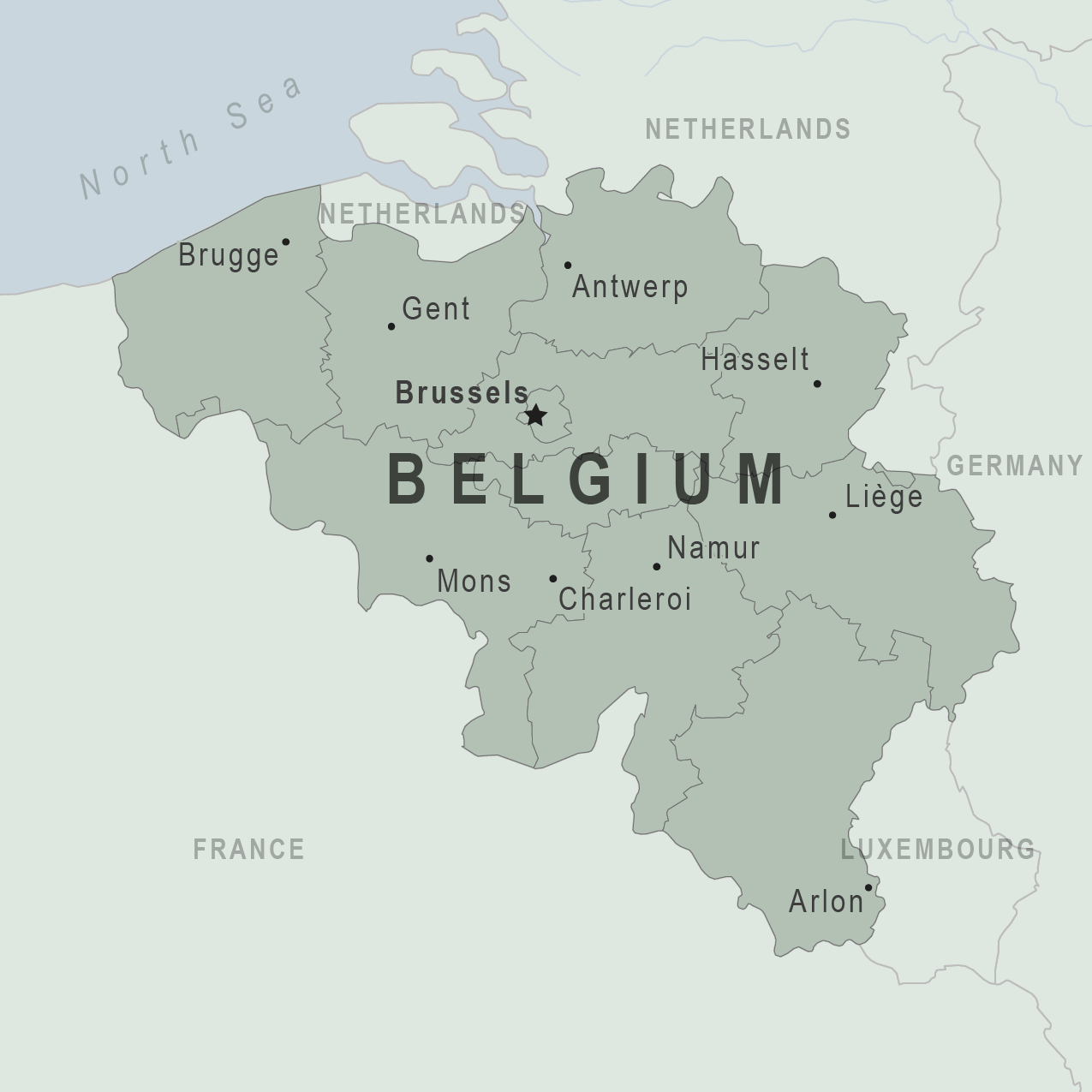
There are no notices currently in effect for Belgium.
⇧ Top
Check the vaccines and medicines list and visit your doctor at least a month before your trip to get vaccines or medicines you may need. If you or your doctor need help finding a location that provides certain vaccines or medicines, visit the Find a Clinic page.
Routine vaccines
Recommendations.
Make sure you are up-to-date on all routine vaccines before every trip. Some of these vaccines include
- Chickenpox (Varicella)
- Diphtheria-Tetanus-Pertussis
- Flu (influenza)
- Measles-Mumps-Rubella (MMR)
Immunization schedules
All eligible travelers should be up to date with their COVID-19 vaccines. Please see Your COVID-19 Vaccination for more information.
COVID-19 vaccine
Hepatitis A
Consider hepatitis A vaccination for most travelers. It is recommended for travelers who will be doing higher risk activities, such as visiting smaller cities, villages, or rural areas where a traveler might get infected through food or water. It is recommended for travelers who plan on eating street food.
Hepatitis A - CDC Yellow Book
Dosing info - Hep A
Hepatitis B
Recommended for unvaccinated travelers younger than 60 years old traveling to Belgium. Unvaccinated travelers 60 years and older may get vaccinated before traveling to Belgium.
Hepatitis B - CDC Yellow Book
Dosing info - Hep B
Cases of measles are on the rise worldwide. Travelers are at risk of measles if they have not been fully vaccinated at least two weeks prior to departure, or have not had measles in the past, and travel internationally to areas where measles is spreading.
All international travelers should be fully vaccinated against measles with the measles-mumps-rubella (MMR) vaccine, including an early dose for infants 6–11 months, according to CDC’s measles vaccination recommendations for international travel .
Measles (Rubeola) - CDC Yellow Book
Belgium is free of dog rabies. However, rabies may still be present in wildlife species, particularly bats. CDC recommends rabies vaccination before travel only for people working directly with wildlife. These people may include veterinarians, animal handlers, field biologists, or laboratory workers working with specimens from mammalian species.
Rabies - CDC Yellow Book
Tick-borne Encephalitis
Avoid bug bites
Learn more about tick-borne encephalitis at your destination .
Tick-borne Encephalitis - CDC Yellow Book
Avoid contaminated water
Leptospirosis
How most people get sick (most common modes of transmission)
- Touching urine or other body fluids from an animal infected with leptospirosis
- Swimming or wading in urine-contaminated fresh water, or contact with urine-contaminated mud
- Drinking water or eating food contaminated with animal urine
- Avoid contaminated water and soil
Clinical Guidance
Airborne & droplet.
- Breathing in air or accidentally eating food contaminated with the urine, droppings, or saliva of infected rodents
- Bite from an infected rodent
- Less commonly, being around someone sick with hantavirus (only occurs with Andes virus)
- Avoid rodents and areas where they live
- Avoid sick people
Tuberculosis (TB)
- Breathe in TB bacteria that is in the air from an infected and contagious person coughing, speaking, or singing.
Learn actions you can take to stay healthy and safe on your trip. Vaccines cannot protect you from many diseases in Belgium, so your behaviors are important.
Eat and drink safely
Food and water standards around the world vary based on the destination. Standards may also differ within a country and risk may change depending on activity type (e.g., hiking versus business trip). You can learn more about safe food and drink choices when traveling by accessing the resources below.
- Choose Safe Food and Drinks When Traveling
- Water Treatment Options When Hiking, Camping or Traveling
- Global Water, Sanitation and Hygiene | Healthy Water
- Avoid Contaminated Water During Travel
You can also visit the Department of State Country Information Pages for additional information about food and water safety.
Prevent bug bites
Although Belgium is an industrialized country, bug bites here can still spread diseases. Just as you would in the United States, try to avoid bug bites while spending time outside or in wooded areas.
What can I do to prevent bug bites?
- Cover exposed skin by wearing long-sleeved shirts, long pants, and hats.
- Use an appropriate insect repellent (see below).
- Consider using permethrin-treated clothing and gear if spending a lot of time outside. Do not use permethrin directly on skin.
What type of insect repellent should I use?
- FOR PROTECTION AGAINST TICKS AND MOSQUITOES: Use a repellent that contains 20% or more DEET for protection that lasts up to several hours.
- Picaridin (also known as KBR 3023, Bayrepel, and icaridin)
- Oil of lemon eucalyptus (OLE) or para-menthane-diol (PMD)
- 2-undecanone
- Always use insect repellent as directed.
What should I do if I am bitten by bugs?
- Avoid scratching bug bites, and apply hydrocortisone cream or calamine lotion to reduce the itching.
- Check your entire body for ticks after outdoor activity. Be sure to remove ticks properly.
What can I do to avoid bed bugs?
Although bed bugs do not carry disease, they are an annoyance. See our information page about avoiding bug bites for some easy tips to avoid them. For more information on bed bugs, see Bed Bugs .
For more detailed information on avoiding bug bites, see Avoid Bug Bites .
Stay safe outdoors
If your travel plans in Belgium include outdoor activities, take these steps to stay safe and healthy during your trip:
- Stay alert to changing weather conditions and adjust your plans if conditions become unsafe.
- Prepare for activities by wearing the right clothes and packing protective items, such as bug spray, sunscreen, and a basic first aid kit.
- Consider learning basic first aid and CPR before travel. Bring a travel health kit with items appropriate for your activities.
- If you are outside for many hours in the heat, eat salty snacks and drink water to stay hydrated and replace salt lost through sweating.
- Protect yourself from UV radiation : use sunscreen with an SPF of at least 15, wear protective clothing, and seek shade during the hottest time of day (10 a.m.–4 p.m.).
- Be especially careful during summer months and at high elevation. Because sunlight reflects off snow, sand, and water, sun exposure may be increased during activities like skiing, swimming, and sailing.
- Very cold temperatures can be dangerous. Dress in layers and cover heads, hands, and feet properly if you are visiting a cold location.
Stay safe around water
- Swim only in designated swimming areas. Obey lifeguards and warning flags on beaches.
- Do not dive into shallow water.
- Avoid swallowing water when swimming. Untreated water can carry germs that make you sick.
- Practice safe boating—follow all boating safety laws, do not drink alcohol if you are driving a boat, and always wear a life jacket.
Keep away from animals
Most animals avoid people, but they may attack if they feel threatened, are protecting their young or territory, or if they are injured or ill. Animal bites and scratches can lead to serious diseases such as rabies.
Follow these tips to protect yourself:
- Do not touch or feed any animals you do not know.
- Do not allow animals to lick open wounds, and do not get animal saliva in your eyes or mouth.
- Avoid rodents and their urine and feces.
- Traveling pets should be supervised closely and not allowed to come in contact with local animals.
- If you wake in a room with a bat, seek medical care immediately. Bat bites may be hard to see.
All animals can pose a threat, but be extra careful around dogs, bats, monkeys, sea animals such as jellyfish, and snakes. If you are bitten or scratched by an animal, immediately:
- Wash the wound with soap and clean water.
- Go to a doctor right away.
- Tell your doctor about your injury when you get back to the United States.
Reduce your exposure to germs
Follow these tips to avoid getting sick or spreading illness to others while traveling:
- Wash your hands often, especially before eating.
- If soap and water aren’t available, clean hands with hand sanitizer (containing at least 60% alcohol).
- Don’t touch your eyes, nose, or mouth. If you need to touch your face, make sure your hands are clean.
- Cover your mouth and nose with a tissue or your sleeve (not your hands) when coughing or sneezing.
- Try to avoid contact with people who are sick.
- If you are sick, stay home or in your hotel room, unless you need medical care.
Avoid sharing body fluids
Diseases can be spread through body fluids, such as saliva, blood, vomit, and semen.
Protect yourself:
- Use latex condoms correctly.
- Do not inject drugs.
- Limit alcohol consumption. People take more risks when intoxicated.
- Do not share needles or any devices that can break the skin. That includes needles for tattoos, piercings, and acupuncture.
- If you receive medical or dental care, make sure the equipment is disinfected or sanitized.
Know how to get medical care while traveling
Plan for how you will get health care during your trip, should the need arise:
- Carry a list of local doctors and hospitals at your destination.
- Review your health insurance plan to determine what medical services it would cover during your trip. Consider purchasing travel health and medical evacuation insurance for things your regular insurance will not cover.
- Carry a card that identifies, in the local language, your blood type, chronic conditions or serious allergies, and the generic names of any medicines you take.
- Bring copies of your prescriptions for medicine and for eye glasses and contact lenses.
- Some prescription drugs may be illegal in other countries. Call Belgium’s embassy to verify that all of your prescription(s) are legal to bring with you.
- Bring all the medicines (including over-the-counter medicines) you think you might need during your trip, including extra in case of travel delays. Ask your doctor to help you get prescriptions filled early if you need to.
Many foreign hospitals and clinics are accredited by the Joint Commission International. A list of accredited facilities is available at their website ( www.jointcommissioninternational.org ).
Select safe transportation
Motor vehicle crashes are the #1 killer of healthy US citizens in foreign countries.
Be smart when you are traveling on foot.
- Use sidewalks and marked crosswalks.
- Pay attention to the traffic around you, especially in crowded areas.
- Remember, people on foot do not always have the right of way in other countries.
Riding/Driving
Choose a safe vehicle.
- Choose official taxis or public transportation, such as trains and buses.
- Make sure there are seatbelts.
- Avoid overcrowded, overloaded, top-heavy buses and minivans.
- Avoid riding on motorcycles or motorbikes, especially motorbike taxis. (Many crashes are caused by inexperienced motorbike drivers.)
- Choose newer vehicles—they may have more safety features, such as airbags, and be more reliable.
- Choose larger vehicles, which may provide more protection in crashes.
Think about the driver.
- Do not drive after drinking alcohol or ride with someone who has been drinking.
- Consider hiring a licensed, trained driver familiar with the area.
- Arrange payment before departing.
Follow basic safety tips.
- Wear a seatbelt at all times.
- Sit in the back seat of cars and taxis.
- When on motorbikes or bicycles, always wear a helmet. (Bring a helmet from home, if needed.)
- Do not use a cell phone or text while driving (illegal in many countries).
- Travel during daylight hours only, especially in rural areas.
- If you choose to drive a vehicle in Belgium, learn the local traffic laws and have the proper paperwork.
- Get any driving permits and insurance you may need. Get an International Driving Permit (IDP). Carry the IDP and a US-issued driver's license at all times.
- Check with your auto insurance policy's international coverage, and get more coverage if needed. Make sure you have liability insurance.
- Avoid using local, unscheduled aircraft.
- If possible, fly on larger planes (more than 30 seats); larger airplanes are more likely to have regular safety inspections.
- Try to schedule flights during daylight hours and in good weather.
Helpful Resources
Road Safety Overseas (Information from the US Department of State): Includes tips on driving in other countries, International Driving Permits, auto insurance, and other resources.
The Association for International Road Travel has country-specific Road Travel Reports available for most countries for a minimal fee.
Maintain personal security
Use the same common sense traveling overseas that you would at home, and always stay alert and aware of your surroundings.
Before you leave
- Research your destination(s), including local laws, customs, and culture.
- Monitor travel advisories and alerts and read travel tips from the US Department of State.
- Enroll in the Smart Traveler Enrollment Program (STEP) .
- Leave a copy of your itinerary, contact information, credit cards, and passport with someone at home.
- Pack as light as possible, and leave at home any item you could not replace.
While at your destination(s)
- Carry contact information for the nearest US embassy or consulate .
- Carry a photocopy of your passport and entry stamp; leave the actual passport securely in your hotel.
- Follow all local laws and social customs.
- Do not wear expensive clothing or jewelry.
- Always keep hotel doors locked, and store valuables in secure areas.
- If possible, choose hotel rooms between the 2nd and 6th floors.
Healthy Travel Packing List
Use the Healthy Travel Packing List for Belgium for a list of health-related items to consider packing for your trip. Talk to your doctor about which items are most important for you.
Why does CDC recommend packing these health-related items?
It’s best to be prepared to prevent and treat common illnesses and injuries. Some supplies and medicines may be difficult to find at your destination, may have different names, or may have different ingredients than what you normally use.
If you are not feeling well after your trip, you may need to see a doctor. If you need help finding a travel medicine specialist, see Find a Clinic . Be sure to tell your doctor about your travel, including where you went and what you did on your trip. Also tell your doctor if you were bitten or scratched by an animal while traveling.
For more information on what to do if you are sick after your trip, see Getting Sick after Travel .
Map Disclaimer - The boundaries and names shown and the designations used on maps do not imply the expression of any opinion whatsoever on the part of the Centers for Disease Control and Prevention concerning the legal status of any country, territory, city or area or of its authorities, or concerning the delimitation of its frontiers or boundaries. Approximate border lines for which there may not yet be full agreement are generally marked.
Other Destinations
If you need help finding travel information:
Message & data rates may apply. CDC Privacy Policy
File Formats Help:
- Adobe PDF file
- Microsoft PowerPoint file
- Microsoft Word file
- Microsoft Excel file
- Audio/Video file
- Apple Quicktime file
- RealPlayer file
- Zip Archive file
Exit Notification / Disclaimer Policy
- The Centers for Disease Control and Prevention (CDC) cannot attest to the accuracy of a non-federal website.
- Linking to a non-federal website does not constitute an endorsement by CDC or any of its employees of the sponsors or the information and products presented on the website.
- You will be subject to the destination website's privacy policy when you follow the link.
- CDC is not responsible for Section 508 compliance (accessibility) on other federal or private website.

Is Belgium Safe? A Comprehensive Analysis of Security and Travel Tips

Belgium is generally a very safe country by world standards. However, it’s important to keep safety in mind when planning a trip to any county
Crime rates in Belgium are relatively low, and most travelers experience no issues during their stay. However, petty theft and pickpocketing can be a concern, particularly in busy, tourist-heavy areas such as Brussels.
of course, you should always take safety precautions when traveling, but also stay up to date with any threats of terrorism or travel advisories when you are abroad.
Key Takeaways
- Belgium is generally a safe destination with low crime rates, but travelers should still exercise caution and be aware of potential risks.
- Petty theft and pickpocketing are concerns in busy areas; stay vigilant and protect your belongings.
- Despite the ongoing terrorism threat, Belgium’s public transportation system remains safe and reliable.
Table of Contents

General Safety in Belgium
As I mentioned above, Belgium is generally considered a safe country for travelers. However, in bigger cities like Brussels and Antwerp , you should be aware that petty theft and pickpocketing can occur, especially in crowded areas or on public transportation. To protect your belongings, keep a close eye on your personal items and consider using a secure travel bag with anti-theft features.
Terrorism has also been a challenge in Belgium, although the risk level has decreased in recent years. Visitors should always be vigilant, stay informed about local news and events, and follow the advice of local authorities. By exercising a high degree of caution and following travel safety tips, tourists can better protect themselves from potential threats.
When exploring the major cities in Belgium, such as
Travelers should avoid dark and deserted areas at night, especially if they are unfamiliar with the area. It’s also a good practice to stick to well-lit streets and make use of the buddy system when possible. By doing so, you can effectively minimize the risk of encountering issues while moving around in Belgian cities.
Crime Rates and Types
In this section, we will discuss various crime rates and types in Belgium, including violent crime, theft and burglaries, as well as scams and fraud.
Violent Crime
Violent crimes in Belgium are relatively low compared to other countries. Intentional homicides can occur as a result of various factors, such as domestic disputes, interpersonal violence, and gang-related conflicts over turf or control 1 . However, these incidents are generally limited in number and are not committed by large, organized groups.
Theft and Burglaries
Belgium experiences typical theft and burglary rates, like many other European countries. The occurrence of these crimes tends to be higher in the bigger cities, like most crime. Nonetheless, the overall safety in Belgium remains comparatively good, with large cities such as Brussels being considered safer than those in nearby European countries .
Scams and Fraud
Scams and fraud are also present in Belgium, as in any other country. Tourists and residents alike should remain vigilant and cautious, particularly when visiting tourist hotspots or engaging in online transactions. Being aware of the various methods used by scammers can help you avoid falling victim to such crimes.
- Belgium Crime Rate & Statistics 1990-2023 ↩
Transportation Safety
Road safety.
Belgium has a well-developed road infrastructure, and the authorities closely monitor and enforce traffic regulations. Despite these efforts, road accidents still occur, with 4.3 road fatalities per 100,000 population recorded in 2020 . The main causes of accidents include
- distracted driving
- driving under the influence
To address these concerns, stricter control of speed limits, black-spot treatment, and infrastructure adjustments are implemented. Pedestrians, cyclists, and motorcyclists should exercise caution, as they are also involved in accidents, accounting for 13%, 17%, and 19% of fatalities, respectively. Wearing appropriate safety gear, staying visible, and following traffic rules can significantly reduce the risk of accidents.
Public Transport
Belgium’s public transportation system is reliable and safe, including buses, trams, and trains. However, travelers are advised to be vigilant as pickpockets and thieves are known to frequent these modes of transport. According to Travel Safe – Abroad , pickpocketing risk is high in public transport.
To protect oneself from these risks, be aware of your surroundings, keep personal belongings secure, and avoid displaying valuable items or electronics. Additionally, try to travel in well-lit, crowded areas, and avoid isolated stations or platforms, especially during late hours.
If you are heading to Brussels, particularly Bruxelles-Midi or Brussel-Zuid, then I recommend not walking directly to your destination. Instead, take a local bus to get around. It is what the locals do and will help you avoid the most dodgy area of town.
Likewise, if you arrive at Antwerp Central station, particularly at night, try to catch a tram or hail an Uber or taxi to avoid walking around and attracting attention.
Travel Safety Tips
When planning a trip to Belgium, it is essential to keep safety in mind. Below are a few key areas to consider, including emergency numbers and personal safety precautions.
Emergency Numbers
In case of emergencies, familiarize yourself with Belgium’s emergency numbers. Dialing 112 will connect you to the police, fire, and medical assistance services. It is crucial to have this number at hand in case of any unfortunate incident during your travel.
Personal Safety Precautions
While Belgium is generally a safe country, it is essential to take standard safety and security precautions. Always be aware of your surroundings, especially in crowded tourist areas and train stations. Pickpocketing and petty theft may occur, so keep your personal belongings secure at all times.
When traveling on public transportation, remain vigilant and be cautious of strangers who might approach you. At night, avoid walking alone in unfamiliar or poorly lit areas. Stick to well-traveled streets and populated areas where possible.
Additionally, Belgium faces a risk of terrorism, and travelers should exercise increased caution. Stay informed about any safety-related updates, and be prepared to follow the advice of local authorities. Taking these safety precautions into consideration will help ensure a more enjoyable and secure visit to Belgium.
Frequently Asked Questions
How safe is it for tourists in belgium.
Belgium is generally safe for tourists, but like any other country, it is important to remain vigilant and take precautions. Petty theft and pickpocketing can occur in crowded tourist destinations, so keep an eye on your belongings and follow safety recommendations.
What is the crime rate in Belgium?
The crime rate in Belgium is moderate and similar to various other European countries. Violent crimes are relatively uncommon, but incidents of petty theft and pickpocketing can be more frequent in tourist-heavy areas.
Are there any areas to avoid in Belgium for safety reasons?
There are no specific areas in Belgium known to be particularly dangerous for tourists. However, it is always a good idea to research your destination beforehand and avoid traveling to neighborhoods with a high crime rate or a reputation for being unsafe. The Most Dangerous Cities in Belgium list can provide additional information.
What precautions should one take when visiting Belgium?
When visiting Belgium, follow common safety practices such as: Avoiding poorly lit or deserted areas Safeguarding your personal belongings Not displaying valuable items in public Staying vigilant in crowded places It is also important to familiarize yourself with local customs and cultural sensitivities to ensure a respectful and safe visit.
How reliable is public transportation in Belgium in terms of safety?
Public transportation in Belgium, such as buses, trams, and trains, is generally reliable and safe. However, be aware of pickpockets, especially in crowded stations and during rush hours. Keep your belongings secure and stay vigilant while using public transportation.
Does Belgium have any specific travel warnings or advisories?
The U.S. Department of State advises travelers to exercise increased caution in Belgium due to the potential risk of terrorism. Terrorist groups may plot attacks targeting tourist locations, transportation hubs, and other public spaces, but the country is generally safe for visiting. Keep yourself informed and up to date on the Belgium Travel Advisory for any changes.
Related Posts

Belgian Inventions: Surprising Everyday Ideas & Products

Exploring the Major Airports in Belgium: Your Guide to Hassle-Free Travel
Leave a comment cancel reply.
Your email address will not be published. Required fields are marked *
Save my name, email, and website in this browser for the next time I comment.
- Nederlands ( Dutch )
- Français ( French )

coronavirus.brussels
Brussels information portal on the coronavirus
Request your Covid certificate to travel Covid-safe
Since 1 July, the Covid certificates allow you to travel more easily within the European Union. If you have been vaccinated, recently had a negative Covid test or recently recovered from a Covid-19 infection, since 1 July, you can use one of these certificates to prove that you can travel Covid-safe.
Please note : Even with a Covid certificate, it is best to check before you leave whether and what specific measures apply in the country of your destination. More information below.
Which information is on a Covid certificate?
There are three types of certificates:
- a vaccination certificate , which indicates when you were vaccinated. This certificate is valid for one year from the date of vaccination.
- a test certificate , serving as proof of a negative COVID-19 test. This certificate is valid for 72 or 48 hours respectively, counting from the time the test was taken, depending on whether the test taken is a PCR test or a rapid antigen test.
- a recovery certificate , for people who have recovered for at least 11 days after a positive COVID-19 test. This certificate is valid for 180 days from the date of the test.
A single person can have several certificates. A certificate is created for each vaccination dose and each test. Vaccination certificates also indicate for which vaccination the certificate has been issued, e.g. whether this is the first or second dose of a specific type of vaccine. Each shot thus generates a new certificate, each time with a maximum validity period.
The certificates are a European agreement and contain a unique QR code. EU Member States scan this code, allowing them to check whether the certificate is correct and valid. The certificate is drawn up in English and in the three national languages.
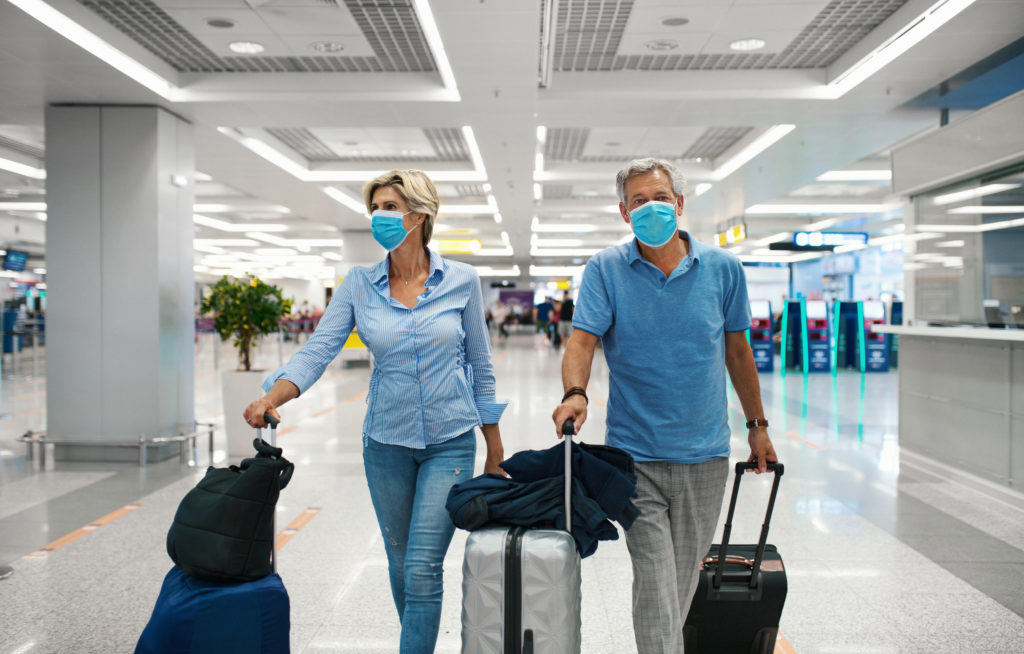
When will my Covid certificate be available?
The certificates are available:
- For a vaccination certificate , the morning after the day on which the vaccination centres entered the data into the Vaccinnet database. This is usually the day of the vaccination or a few days later. We can’t say for sure.
- For a test certificate , it is 1,5 hours after the laboratory has entered the test results into the Sciensano database. In practice, this is at the same time as, or shortly after, you are notified of your test result.
- For a recovery certificate , it is 11 days after the positive test was taken.
How can I obtain a Covid certificate?
You can download it via the mobile app CovidSafeBE or via the websites brusselshealthnetwork.be or masanté.be / mijngezondheid.be . From the age of 16, you can access your own certificates AND those of your underage children when you log in to these websites with your eID or Itsme. If you want to consult or download a certificate for your children, the age of your children, whether or not they have an eID and whether it is an eID with or without a pin code, don’t matter. More information on how to obtain a Covid certificate for your children is available here .
You can only download your personal certificate or that of your underage children. Other adult family members must access and download their own certificate.
If you have difficulties to access the internet, you can also call 02/214.19.19. Via an automatic selection menu, you can choose to have your certificate sent to your eBox 24/7, if you have already activated this tool, or to have it sent by post to your official address. Please take into account that there is a delivery period of 5 working days. Test and recovery certificates are not sent by post.
What if the information on my certificate is incorrect?
It is important to check your data as soon as possible, especially if you are planning to travel. Go to masanté.be , mijngezondheid.be or brusselshealthnetwork.be or install the CovidSafeBE app right away. You can log in using your electronic ID-card, ItsMe or another digital key.
Where can I find more information?
- More information about the CovidSafeBE and frequently asked questions about the Covid certificate can be found on CovidSafe.be .
- More information about the measures in place in your country of destination can be found at https://reopen.europa.eu/en .
- Travel advice from the Ministry of Foreign Affairs can be found here (available in French & Dutch): https://diplomatie.belgium.be/fr/Services/voyager_a_letranger/conseils_par_destination
- Information on travel is available on https://www.info-coronavirus.be/en/safe-travel/
Reminder: It is still recommended to wear a mask in healthcare settings and in crowded places such as public transport
Cookies on GOV.UK
We use some essential cookies to make this website work.
We’d like to set additional cookies to understand how you use GOV.UK, remember your settings and improve government services.
We also use cookies set by other sites to help us deliver content from their services.
You have accepted additional cookies. You can change your cookie settings at any time.
You have rejected additional cookies. You can change your cookie settings at any time.
- Passports, travel and living abroad
- Travel abroad
- Foreign travel advice
Entry requirements
This information is for people travelling on a full ‘British citizen’ passport from the UK. It is based on the UK government’s understanding of the current rules for the most common types of travel.
The authorities in Belgium set and enforce entry rules. If you’re not sure how these requirements apply to you, contact the Belgian Embassy in the UK .
COVID-19 rules
There are no COVID-19 testing or vaccination requirements for travellers entering Belgium.
Travelling through Calais
If you’re travelling through Calais, check the travel advice for France .
Passport validity requirements
Belgium follows Schengen area rules . Your passport must:
- have a ‘date of issue’ less than 10 years before the date you arrive – if you renewed your passport before 1 October 2018, it may have a date of issue that is more than 10 years ago
- have an ‘expiry date’ at least 3 months after the date you plan to leave the Schengen area
Check with your travel provider that your passport and other travel documents meet requirements. Renew your passport if you need to.
You will be denied entry if you do not have a valid travel document or try to use a passport that has been reported lost or stolen.
Visa requirements
You can travel without a visa to the Schengen area , which includes Belgium, for up to 90 days in any 180-day period. This applies if you travel:
- as a tourist
- to visit family or friends
- to attend business meetings, cultural or sports events
- for short-term studies or training
The requirements for working in Belgium are different.
If you’re travelling to other Schengen countries as well, make sure your whole visit is within the 90-day visa-free limit. Visits to Schengen countries in the 180 days before you travel count towards your 90 days.
Make sure you get your passport stamped on entry and exit.
If you’re a visitor, border guards will look at your entry and exit stamps to check you have not overstayed the 90-day visa-free limit for the Schengen area.
If your passport is missing a stamp, show evidence of when and where you entered or left the Schengen area (for example, boarding passes or tickets) and ask the border guards to add the date and location in your passport.
At Belgian border control, you may also need to:
- show a return or onward ticket
- show you have enough money for your stay
Staying longer than 90 days in a 180-day period
To stay longer, you must meet the Belgian government’s entry requirements. Check which type of visa or work permit you need with the Belgian Embassy in the UK .
If you are in Belgium with a residence permit or long-stay visa, this does not count towards your 90-day visa-free limit.
Read about passport stamping if you live in Belgium .
Children aged 17 and under
Adults, including parents and guardians, who are travelling to or from Belgium with children aged 17 or under may have to provide proof of their relationship to the children they are accompanying. Carry a birth certificate or court order, particularly if you have a different surname to the children.
Vaccine requirements
For details about medical entry requirements and recommended vaccinations, see TravelHealthPro’s Belgium guide .
Customs rules
There are strict rules about goods that can be brought into and taken out of Belgium . You must declare anything that may be prohibited or subject to tax or duty.
Taking food into Belgium
You cannot take meat, milk or products containing them into EU countries . There are some exceptions such as powdered baby milk, baby food and special foods or pet feed required for medical reasons.
Taking money into or out of Belgium
You must complete a disclosure form at customs if you’re carrying currency worth 10,000 euros or more.
Related content
Is this page useful.
- Yes this page is useful
- No this page is not useful
Help us improve GOV.UK
Don’t include personal or financial information like your National Insurance number or credit card details.
To help us improve GOV.UK, we’d like to know more about your visit today. Please fill in this survey (opens in a new tab) .

Search Smartraveller

Latest update
Exercise a high degree of caution in Belgium due to the threat of terrorism.
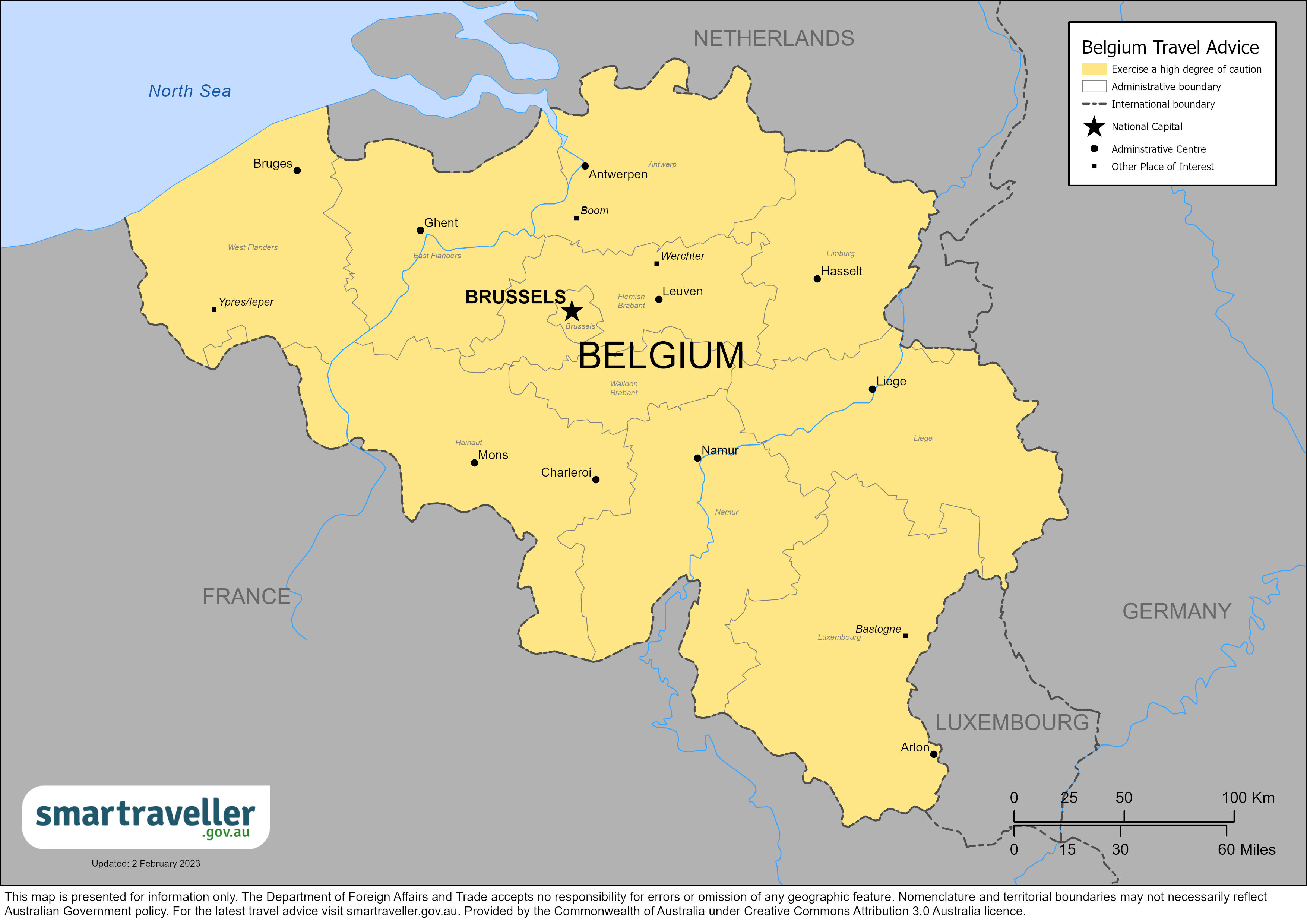
Belgium (PDF 198.98 KB)
Europe (PDF 2.62 MB)
Local emergency contacts
Fire and rescue services, medical emergencies, advice levels.
- The threat level for Belgium, including Brussels, remains at level 3 of 4, meaning there's a possible and imminent threat. (A threat level of 3 is identified as 'Serious' by the Belgian Coordination Unit for Threat Analysis).
- There's an ongoing threat of terrorism in Belgium. Terrorists have staged attacks and may plan more. Crowded places, such as music and cultural events, festivals, tourist areas, shopping areas, transport hubs, major sporting events and other public areas, are possible targets. Be vigilant in public places and follow the advice of local authorities. Report anything suspicious to the police.
- Petty crime, such as mugging, pickpocketing and bag snatching, occurs. Thieves often try to distract you. Take care of your belongings and passports, particularly at tourist spots, on public transport, train stations and other crowded areas.
- Demonstrations are common. Belgium hosts large international meetings. Increased security can disrupt transport. Avoid affected areas.
Full travel advice: Safety
- Medical care and facility standards are similar to those in Australia.
- Australia has a reciprocal health care agreement with Belgium. You can get treated in public medical facilities, but you still need travel insurance.
Full travel advice: Health
- Always carry your passport or Belgian government-issued ID.
- It's illegal to wear clothing that largely or completely hides your face in public places (parks, buildings, public transport, on the street). Wearing such clothing risks a fine and/or detention for up to 7 days. There's no exemption for tourists.
Full travel advice: Local laws
- Belgium is a part of the Schengen area , along with many other European countries, meaning you can enter Belgium without a visa in some cases. In other situations, you'll need a visa.
- Entry and exit conditions can change at short notice. Contact the nearest Belgian embassy or consulate for the latest details.
Full travel advice: Travel
Local contacts
- The Consular Services Charter details what we can and can't do to help you overseas.
- For consular help, contact the Australian Embassy in Brussels.
- To stay up to date with local information, follow the embassy’s social media accounts.
Full travel advice: Local contacts
Full advice
Following a terrorist attack in 2023, the threat level for Belgium, including Brussels, is now level 3 of 4, meaning there's a possible and imminent threat. (A threat level of 3 is identified as 'Serious' by the Belgian Coordination Unit for Threat Analysis.)
Brussels hosts several international institutions (EU and NATO) and government and foreign embassy buildings, which are sensitive locations.
There have been high-profile terrorist attacks across Belgium. Previous incidents include attacks against civilians and security forces:
- October 2023 – 2 people were shot and killed in Brussels.
- Nov 2022 - a police officer was killed and another injured in a suspected terrorist incident in Brussels.
- May 2018 – 2 police officers and a passer-by were killed in a shooting in Liege in a suspected terrorist incident.
- June 2017 — a failed attack at Brussels central train station
- March 2016 — attacks at Brussels National Airport, Zaventem and Maalbeek/Maelbeek metro station — 32 people killed and 300 injured.
More attacks could happen at any time.
Expect heightened security measures, including:
- an increased police presence
- increased caution and scrutiny from security forces
- potential added security measures in certain places
Crowded places may be the target of an attack, such as:
- tourist areas
- shopping areas
- train stations
- public transport
- concerts, music events and festivals
- major sporting events
Belgian authorities have successfully disrupted various attack plans, and Belgian police continue to conduct anti-terror operations. These could occur with little or no warning.
If you're in the area of a police operation:
- follow the instructions and advice of local authorities
- stay indoors and close windows and blinds, if possible
Extra security arrangements are in place at the Australian Embassy in Brussels. Visitors must pass a security screening. Don't bring your luggage with you.
To protect yourself from terrorism:
- report anything suspicious to the police
- monitor official and media sources for updates
- follow the advice of local authorities
Terrorism is a threat worldwide.
Public Alert System
The Belgian Government provides information in the case of emergencies through the Belgian Crisis Centre (available in French, Dutch or German) and social media ( Facebook and Twitter ). You can also register to be notified in an emergency through the Belgian Public Alert System ( Be-Alert ).
More information:
Crimes such as theft, mugging , pickpocketing, and bag snatching are common in urban and tourist areas. Theft on board intercity and international trains is also common.
Hotspots for crime include the popular tourist spots in:
Pickpockets also target passengers in transportation hubs such as the Metro, train stations and airports.
Incidents of petty crime on trains along the Paris-Brussels-Amsterdam and Brussels-London routes are frequent.
Thieves often work in teams of 2 or 3. They distract victims by:
- asking you a question
- spilling food or drink
- telling you someone has spilt something on your clothes
To stay safe from crime:
- take care in transport hubs, tourist areas and some inner-city areas, especially at night
- seek local advice about the safety of certain areas
- take care of your belongings on trains, in public transport and at major train stations, particularly at Gare du Midi/Zuidstation (South Station), Gare de Bruxelles-Nord/Noordstation (North Station) and Gare De Bruxelles-Centrale/Centraalstation (Central Station)
- carry your travel documents while travelling
- avoid walking alone after dark or in isolated areas.
In the event of theft, contact the nearest police station and get a police report.
There has been an increase in violence, including stabbings and shootings, linked to the drug trade in Brussels and other major cities.
In February, shootings occurred in the commune of Brussels, in the Marolles neighbourhood, and around the following locations in the commune Saint-Gilles:
- Port-de-Hal
- Gare du Midi
- Place Jacques Franck
If you're in Brussels:
- be aware of your surroundings
- follow the instructions of local authorities
- expect a heightened police presence in certain areas
Cyber security
You may be at risk of cyber-based threats during overseas travel to any country. Digital identity theft is a growing concern. Your devices and personal data can be compromised, especially if you're connecting to Wi-Fi, using or connecting to shared or public computers, or Bluetooth.
Social media can also be risky in destinations where there are social or political tensions or laws that may seem unreasonable by Australian standards. Travellers have been arrested for things they have said on social media. Don't comment on local or political events on your social media.
More information:
- Cyber security when travelling overseas
Civil unrest and political tension
Demonstrations and strike action often occur in transport hubs, cities, and the Schuman area of Brussels. While most demonstrations are peaceful, there is a risk of isolated incidents of unrest or violence.
Demonstrations are common, often directed at:
- European Union institutions
Belgium often hosts large international meetings. Heads of state, senior government and business figures may attend.
Before and during these meetings, authorities often increase security measures around Brussels or other parts of Belgium. This may disrupt travel.
To avoid issues:
- follow the instructions of local authorities or security staff
- monitor local media for updates on possible unrest
- avoid affected areas
- Demonstrations and civil unrest
Climate and natural disasters
Severe weather can affect your travel. Monitor local media for updates.
If you plan to visit an affected area:
- confirm your plans with your tour operator or travel provider
- check conditions with local tour operators and hotels
Register with the Global Disaster Alert and Coordination System to receive alerts on major disasters.
Travel insurance
Get comprehensive travel insurance before you leave.
Your policy needs to cover all overseas medical costs, including medical evacuation. The Australian Government won't pay for these costs.
If you can't afford travel insurance, you can't afford to travel. This applies to everyone, no matter how healthy and fit you are.
If you're not insured, you may have to pay thousands of dollars up-front for medical care.
- what activities and care your policy covers
- that your insurance covers you for the whole time you'll be away.
Physical and mental health
Consider your physical and mental health before you travel, especially if you have an existing medical condition.
See your doctor or travel clinic to:
- have a basic health check-up
- ask if your travel plans may affect your health
- plan any vaccinations you need
Do this at least 8 weeks before you leave.
If you have immediate concerns for your welfare or the welfare of another Australian call the 24-hour Consular Emergency Centre on +61 2 6261 3305 or contact your nearest Australian Embassy, High Commission or Consulate to discuss counselling hotlines and services available in your location .
- General health advice
- Healthy holiday tips (Healthdirect Australia)
Medications
Not all medications available over the counter or by prescription in Australia are available in other countries. Some may even be considered illegal or a controlled substance, even if prescribed by an Australian doctor.
If you plan to bring medication, check if it's legal in Belgium. Take enough legal medication for your trip.
Carry a copy of your prescription or a letter from your doctor stating:
- what the medication is
- your required dosage
- that it's for personal use
Health risks
There have been outbreaks of measles in Belgium. Make sure your vaccinations are up-to-date before you travel.
More Information:
- Communicable diseases (Department of Health and Aged Care)
- Measles immunisation service (Department of Health and Aged Care)
Other health risks
Other health risks in Belgium are broadly similar to those in Australia.
Medical care
The standard of medical facilities is high.
Belgium and Australia have a reciprocal healthcare agreement . You can get subsidised treatment in the Belgian public health system, including:
- medical care
- prescription drugs
To access the reciprocal health care agreement, you must present your:
- valid Medicare card
- current Australian passport or evidence that you're an Australian permanent resident
You may need to pay at the time of treatment and get reimbursed from a Belgian health insurance fund ('mutuelle').
The reciprocal health care agreement does not cover treatment in:
- private medical facilities
- public facilities as a private patient
If you're a private patient, you must pay for any treatment, services or medication you receive.
The reciprocal health care agreement doesn't replace the need for travel insurance.
You're subject to all local laws and penalties, including those that may appear harsh by Australian standards. Research local laws before travelling.
If you're arrested or jailed, the Australian Government will do what it can to help you under our Consular Services Charter . But we can't get you out of trouble or out of jail.
Laws relating to drugs are similar to those of Australia. Possession of drugs and trafficking of drugs are serious offences.
You must carry your passport or a Belgian government-issued ID at all times.
It's illegal to wear clothing that largely or completely hides your face in public places (parks, buildings, public transport, on the street). Wearing such clothing risks a fine and/or detention for up to 7 days. There's no exemption for tourists.
Australian laws
Some Australian criminal laws still apply when you're overseas. If you break these laws, you may face prosecution in Australia.
- Staying within the law and respecting customs
Dual nationality
Belgium recognises dual nationality.
- Dual nationals
- Possessing several nationalities (Kingdom of Belgium)
Visas and border measures
Every country or territory decides who can enter or leave through its borders. For specific information about the evidence you'll need to enter a foreign destination, check with the nearest embassy, consulate or immigration department of the destination you're entering.
Visa conditions
Belgium is a part of the Schengen area , along with many other European countries, meaning you can enter Belgium without a visa in some cases.
In other situations, get a visa before you travel.
Always carry your passport when you cross borders, even in the Schengen area .
Entry and exit conditions can change at short notice. Contact the nearest embassy or consulate for details about visas, currency, customs and quarantine rules.
Other formalities
Increased security measures are in force at international airports and train stations.
Carry your passport when you enter or exit Belgium, even by road or rail.
Contact your airline or travel agent for updates or check-in requirements.
- Belgian Foreign Affairs website
Some countries won't let you enter unless your passport is valid for 6 months after you plan to leave that country. This can apply even if you're just transiting or stopping over.
Some foreign governments and airlines apply the rule inconsistently. Travellers can receive conflicting advice from different sources.
You can end up stranded if your passport is not valid for more than 6 months.
The Australian Government does not set these rules. Check your passport's expiry date before you travel. If you're not sure it'll be valid long enough, consider getting a new passport .
Lost or stolen passport
Your passport is a valuable document. It's attractive to people who may try to use your identity to commit crimes.
Some people may try to trick you into giving them your passport. Always keep it in a safe place.
If your passport is lost or stolen, tell the Australian Government as soon as possible:
- In Australia, contact the Australian Passport Information Service .
- If you're overseas, contact the nearest Australian embassy or consulate .
Also, go to the nearest police station to:
- report the crime
- get a declaration of theft
This may be useful for any insurance claims.
Passport with 'X' gender identifier
Although Australian passports comply with international standards for sex and gender, we can't guarantee that a passport showing an 'X' in the sex field will be accepted for entry or transit by another country. Contact the nearest embassy, high commission or consulate of your destination before you arrive at the border to confirm if authorities will accept passports with 'X' gender markers.
- LGBTQIA+ travellers
Belgium's currency is the Euro.
ATMs are widely available.
If you're travelling between Belgium and a non-EU country, declare currency of 10,000 euros or more or equivalent. This covers all forms of currency, not only cash.
You'll be fined if you don't declare currency or give incorrect information on entry or exit.
You don't need to declare currency if you're travelling to or from another EU country.
Local travel
Driving permit.
For short visits, you'll need both:
- an International Driving Permit (IDP)
- a valid Australian driver's licence
Car rental companies may require both documents.
You must be at least 18 years old to drive in Belgium.
If you register as a resident with a local commune, you'll need to change your Australian driver's licence for a Belgian licence.
Communes usually require the date of issue of your Australian licence. If your licence doesn't show this, contact your state or territory licensing authority for an official notice stating the issue date.
Road travel
Road conditions and road safety are very good throughout the country. The 'priority to the right' system is in effect in Belgium.
Drivers must give way to vehicles approaching from the right at intersections. This is often a surprise to foreign drivers and results in accidents.
- Driving or riding
Motorcycles
Check that your travel insurance policy covers you when riding a motorbike.
Always wear a helmet.
Only use licensed, official taxis. Assaults and robberies have occurred in unlicensed taxis.
Targets for unlicensed taxis include high-traffic destinations, such as:
- other tourist locations
Rideshare options are available. Taxis can be booked via the Uber app.
Public transport
Pickpockets operate on intercity and international trains.
Pay close attention to valuables and your passport on trains and other forms of public transport.
Check Belgian Rail for bookings and any service interruptions.
- Transport and getting around safely
Electric scooter regulations
The maximum speed limit for riding an electric scooter is 25km/h, and riding with a passenger is illegal.
It's illegal for people aged 15 and under to use electric scooters, except in a few designated areas such as pedestrianised, private residential and recreational areas, and segregated cycle paths.
DFAT doesn't provide information on the safety of individual commercial airlines or flight paths.
See Belgium's air safety profile with the Aviation Safety Network.
Emergencies
Depending on what you need, contact your:
- family and friends
- travel agent
- insurance provider
Contact the nearest police station if it isn't an emergency.
Always get a police report when you report a crime.
Your insurer should have a 24-hour emergency number.
Consular contacts
Read the Consular Services Charter for what the Australian Government can and can't do to help you overseas.
Australian Embassy, Brussels
Level 7, Avenue des Arts/Kunstlaan 56 1000 Brussels, Belgium Phone: (+32 2) 286 0500 Email: [email protected] Website: belgium.embassy.gov.au Facebook: Australian Embassy, Brussels X: @ AustraliaEU
Check the Embassy website for details about opening hours and any temporary closures.
Visitors must pass a security screening. Don't bring luggage with you.
24-hour Consular Emergency Centre
In a consular emergency, if you can't contact an embassy, call the 24-hour Consular Emergency Centre on:
- +61 2 6261 3305 from overseas
- 1300 555 135 in Australia

Travelling to Belgium?
Sign up to get the latest travel advice updates..
Be the first to know official government advice when travelling.
- English (EN)
- Español (ES)
- Português (BR)
Is Brussels Safe? Crime Rates & Safety Report
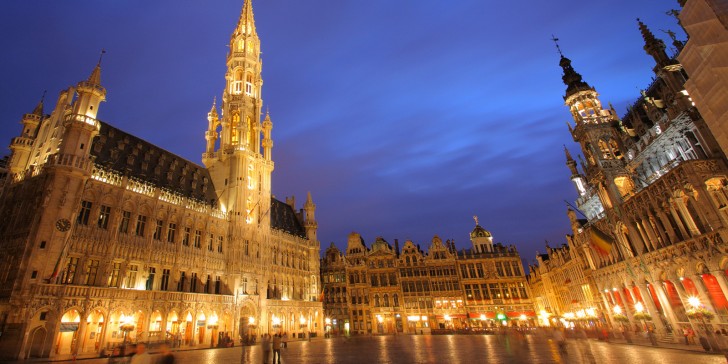
Belgium : Safety by City
Brussels is the capital city of Belgium with the city population of 1 million inhabitants.
The Brussels-Capital Region is located in the central part of the country and it is considered an important city-region in Europe.
Brussels is a city full of surprises and its Art Nouveau architecture, parks, and its royal gardens are only some of the must-see tourist attractions.
Once you are in Brussels do not skip some of the sights like Fin-de-Siècle Museum, The Parlamentarium, and Mini-Europe, the only park where you can see the whole of Europe in just a few hours.
You can also discover and explore human nature at the Museum of Natural Sciences in Brussels.
For those younger tourists who want entertainment and great nightlife, Brussels offers clubs with the international DJs that come there every weekend.
- Warnings & Dangers in Brussels
OVERALL RISK: MEDIUM
The everlasting question of all tourists once they decide to visit a certain city is whether it is safe or dangerous. All in all, Brussels is considered a safe city with a safety score of 60%.
TRANSPORT & TAXIS RISK: MEDIUM
When the risk of using taxis in Brussels is concerned, there is a constant possibility of being overcharged or driven around the city. Licensed taxis are always a better solution. You should be vigilant when in public transport because pickpockets or bag snatchers might happen to be there.
PICKPOCKETS RISK: HIGH
Unfortunately, Brussels is considered one of the top capital cities where pickpocket risk is at a very high level. The whole of Belgium is believed to be unsafe regarding thieves, especially at train stations and subways.
NATURAL DISASTERS RISK: LOW
Brussels, as well as the whole of Belgium, is not exposed to any natural disaster risk.
MUGGING RISK: MEDIUM
When the risk of being mugged is concerned, Belgium is, generally, a safe country. However, certain zones of Brussels should be avoided. To stay safe and get familiar with those dangerous zones, tourists should ask for local advice.
TERRORISM RISK: HIGH
Recent happenings show that there is a possibility that a terrorist attack repeats in this country, so it is advised to stay away from demonstrations and other forms of gatherings.
SCAMS RISK: MEDIUM
Being extremely attractive to criminals and lawbreakers, touristic places such as Brussels are believed to be at the medium level of scam risks. Tourists need to pay special attention to people who offer help and act strangely in the streets, especially in crowded areas.
WOMEN TRAVELERS RISK: LOW
Belgium is a relatively safe country concerning women visitors and there are very few threats to their safety. Women need to use common sense when they are out in the street.
- So... How Safe Is Brussels Really?
Like many European countries, Belgium is relatively safe for tourists as well as its capital city.
Although Brussels is a quite small city, in comparison with other European capitals, there are plenty of things waiting to be discovered once a tourist decides to visit it.
However, among all that beauty, there are some sorts of criminal acts.
It is a city with a few threats to travelers’ safety and the main risk is that of being pickpocketed in the street or at the train stations such as Bruxelles Midi, Bruxelles North, and Bruxelles Central station.
Some other areas that should be avoided by tourists, especially at night, are Anneessens, Anderlecht, Schaerbeek, Brussels North and Molenbeek.
What tourists should know is that since the introduction of the Euro, Brussels has become more expensive, but it is still cheaper than most cities in neighboring France.
Also, the weather in Brussels is changing during a day from sunny to heavy rainfall, and then back to sunshine.
Besides all this, Brussels is the place where there is always something fun going on, there is plenty to see and do and it is certainly worth visiting.
- How Does Brussels Compare?
- Useful Information
For those visitors that are planning to stay less than 90 days in Belgium, visas are not required. The people from the EU countries can stay as long as they want. However, there are certain countries whose inhabitants need to have a visa when visiting Belgium.
The official currency in Belgium is the Euro. Belgium is an expensive country and the minimum money that a tourist need is 70€ per day. Some parts of the country are cheaper than the rest, but it is considered equally expensive as Germany.
A temperate climate is a characteristic of Brussels, with mild temperatures during the whole year. The average temperature in winter is 1°C and only 23°C in summer. The most constant weather is rainfall. Tourists are advised to visit Brussels form June to September.
Visitors usually come to Belgium by plane, especially those from non-European countries. Brussels Airport is an international airport only 12 km from Brussels. It has more than 23 million passengers which makes it the 21st busiest airport in Europe. Other airports that are often used when coming to Belgium are those in Antwerp, Ostend, and Liège.
Travel Insurance
Travel insurance that covers theft, loss and medical problems is always recommended and should be bought before coming to Belgium for a determined period because the policy is concluded for a limited duration.
Brussels Weather Averages (Temperatures)
- Average High/Low Temperature
Belgium - Safety by City
- Where to Next?

13 Reviews on Brussels
It tells alot about safety.
it is really helpful
Hell hole Brussels
About 50% of bruxelles is dangerous, especially after dark,thanks to north africans, bulgarian and romanian gangs.some area’s are even dangerous for the Police to Come, like Molenbeek, Anderlecht, Schaarbeek, St Joost,Brussels South and North stations.i used to work there 22 years ago…is was bad back then, now is much worse..especially muggings,assault, knife attacks, rapes and also gunviolence(murder)
Great info, very informative…
Brussels, not a fan.
Not impressed. Very beautiful buildings but totally rude people. We were trying to leave the Atomium and our cab driver and another got in a shouting match. We left both drivers arguing and got into a third. I tried to ask a question at the Atomium restaurant and was promptly told to “set down”. There were armed military stationed outside our hotel at the central bus station. Finding a cab at Midi was next to impossible. So in summary, not a fan. Will not return.
Worst than terrible
Thief as **** in Brussel Belgium, I and my family got 2 times to attempt to steal our bag & wallet. First, they throw sth at us pretend that it’s a bird shit & help us clean, then they start to steal our wallet but we catch that. Second, the case we are not lucky enough at Atomi, they have their team, they come to us asking us to help them take their picture for them, while we taking pictures of them another one steals our bag, then runs. We call police immediately all we got is just a report & police said they cannot do anything about it. That so pisses off. If you can Please avoid Brussel, Belgium such a thief & pickpocket place! Overall there is not much interesting attraction too. Be careful guys.
Don't miss this amazing city!
I only visited Brussels once and just for a few days. I found it a wonderful city with beautiful architecture, plenty to do, very clean and loved to sit at a cafe outside and drink wonderful beers and watch the changing colors on the buildings in Grand Place. I didn’t have any issues with crime or beggars. I really haven’t had enough experience with Belgians so it would be unfair to weigh in on that. Certainly had no issues / incidents with the people there, though. They’re a bit reserved but certainly didn’t find them rude.
there is a treat hiding for everyone
I live there. If you are vulnerable, avoid west of the city wich is poor, thiefs and other criminals could notice you, some neighborhoods are not easy for everyone. East is quite rich and there is no problems in there but also quite boring. All the attractions and things to do are usually in the middle, so just notice where is the north and cruise at your convenience in a beautiful mashup city
Pls don’t go there for your safe
Very dangerous city. The worst I have ever been. Rats size nearly like cat size . They steal my necklace first day of my visit, when I was with my son…. Just someone slap my face and pull my necklace…I checked police comments and after I realised that they don’t do nothing… nearly no tourist because everyone knows how dangerous is there . I didn’t know… I didn’t know because is not any information on the internet how bad is there, only wrong article that is dangerous same like in the other countries. No!!!! Is very dangerous city!!!!!!! I thing the most dangerous city in Europe. now I know and my friends and family know as well that for safe they shouldn’t go there. Very dirty . And expensive for such a bad city with not many attractions .
been there tons of time and never felt unsafe
Beautiful city
We had a lovely time in Brussels. Never felt unsafe. I didn’t notice any more crime or criminals than any other large European city. Use some common sense and enjoy yourself.
Horrible place. Very dangerous and expensive. Don’t go with expensive item. Such a phone bag rings necklace glasses… poor looking town . Very dirty. A lot of gangs and homeless people. It is not worth to be there even for one minute. Nothing interesting there . Seriously nothing …
Not safe for women
Bruxelles is absolutely not safe for women especially in “non touristic” areas. Never travel alone there and stay away from the “Midi” area, that place is a disaster.
Way overpriced and very unsafe at night.Not worth a visit in my opinion. Italy is the place to go.Much to see and do there.
Share Your Experience Cancel reply
Your Review
Title of your review
Article Contents
- Brussels : Safety by City
- Overall Risk
- Transport & Taxis Risk
- Pickpockets Risk
- Natural Disasters Risk
- Mugging Risk
- Terrorism Risk
- Women Travelers Risk
- Weather Averages (Temperatures)
- User Reviews
- Share Your Experience
Popular Destinations

Safety Index
Recent reviews & comments.
- Edward Alexander on 10 Safest Cities in New Mexico
- Pat Coleman on Hutchinson
- Neil Fredrickson on Hutchinson
- John Mark Howard on Hutchinson
Popular US States
- Pennsylvania
Consultative Committee: free and safe summer travel
Today, the federal government and the federated entities convened the Consultative Committee to lay down the rules for free and safe summer travel. On Wednesday, 9 June, the first step of the Summer Plan also comes into effect, including the reopening of indoor catering and return days to the office for staff working from home.
The Consultative Committee notes that the number of corona patients in intensive care continues to decline and is well below the target threshold of 500 beds. The vaccination campaign is also up to speed, with more than eight in ten vulnerable people (those aged 65 and over and those with underlying conditions) having received their first vaccine dose two weeks ago.
Remain cautious
The Consultative Committee confirms the objective to maximise vaccination coverage of the general population. In the meantime, caution remains the order of the day. For example, it takes up to three weeks after the dose has been administered before the vaccine provides adequate protection. During that time, one can become infected, seriously ill and infect other people. Adhering to the rules of conduct, such as wearing a face mask and respecting the 1.5 metre rule, is therefore still recommended.
Free and safe travel
The Consultative Committee today laid down the rules for travelling freely and safely within the European Union this summer. This will be possible thanks to the European digital corona certificate.
The certificate will be used in all EU countries from 1 July and is proof that someone has been vaccinated against corona, tested negative for corona or has recovered from corona.
Travel to countries outside the European Union, meanwhile, remains strongly advised against.
1. Returning as a resident after staying abroad
Returning from a green or orange zone:
- No obligation to quarantine or test. Please note: the status of a zone can change at any time during your stay.
Returning from a red zone:
Those with a digital corona certificate with full vaccination (+ 2 weeks), a recent negative PCR test (< 72 hours) or recovery certificate do not need to be quarantined.
Those who get tested immediately upon arrival (day 1 or day 2) do not have to go into quarantine. A negative PCR test is required for individuals 12 years of age and older. Children under the age of 12 are exempt from testing requirements.
Returning from a very high risk area (“variants of concern”):
Mandatory 10-day quarantine with PCR testing on day 1 and day 7.
This requirement also applies to persons who have been fully vaccinated or who have already tested negative in the country where they stayed. After all, these are dangerous virus variants that we want to keep out of Europe.
2. Arrival in Belgium as a non-resident
Arrival from a green or orange zone:
- No obligation to quarantine or test.
Arriving from a red zone:
Those with a digital corona certificate with full vaccination (+ 2 weeks), a recent negative PCR test or recovery certificate do not need to be quarantined.
The recent test must not be older than 72 hours before arrival in Belgium.
Arrival from outside the European Union:
- Those coming from outside the European Union must be fully vaccinated (+ 2 weeks) with a vaccine recognised by Europe and take a PCR test on the day of arrival. If the test is negative, this person does not need to be quarantined.
Arrival after staying in a very high risk area (“variants of concern”):
- There is a ban on entry for non-Belgians who do not reside in Belgium and who have been in a very high-risk area at any time during the past 14 days. An exception is made for essential travel by transport staff and diplomats. They must undergo a 10-day mandatory quarantine with PCR testing on day 1 and day 7. The quarantine may only be interrupted for the purpose of the essential reason.
3. Departure abroad
Anyone in possession of a valid digital corona certificate can travel freely within the Member States of the European Union. That is the basic principle. However, destination countries may always impose additional conditions.
You should therefore check the exact travel conditions of the country of destination or of the transit countries sufficiently in advance, to prevent unpleasant surprises.
Passenger Location Form is retained
The use of the Passenger Location Form remains the same.
The distinction between professional and non-professional travel is abolished. As of 1 July, a PLF must also be completed for professional travel instead of the Business Travel Abroad tool (BTA).
Two free PCR tests
For children and adolescents between 6 and 17 years of age and for adults who have not yet had the opportunity to be fully vaccinated and thus to acquire immunity, the cost of a PCR test will be reimbursed up to a maximum of € 55. This applies to tests taken in Belgium, subject to obtaining a Corona Test Prescription Code from the FPS Public Health.
Financial compensation can be obtained no more than 2 times, during the months July, August and September.
Catering industry opening hours
The opening time in the catering industry will be brought forward from 8 a.m. to 5 a.m. from 9 June.
The Consultative Committee also decided that from 9 June onwards, the closing time for both indoor and outdoor catering will be 11.30 p.m.
Test events
The Consultative Committee lays down the approval procedure for some 30 test events during the period from 1 July to 31 August. The aim is to acquire additional knowledge on how to organise an event safely, taking into account available scientific data.
Several test events will be organised on the use of the COVID Safe Ticket, air quality and crowd management, among other things.
Large-scale events
The Consultative Committee clarifies the conditions for larger scale events starting 13 August. For participants in this events, full vaccination (+ 2 weeks) or a recent PCR test (< 72 hours) is required. It will also be possible to provide rapid on-site antigen testing.
The maximum number of participants allowed is 75,000.
Next Consultative Committee
The next Consultative Committee is scheduled for 18 June and will include further details on the Summer Plan starting 1 July.
To conclude: 10 tips for enjoying a safe summer
- Get vaccinated. The more people are vaccinated, the safer it becomes for all of us.
- Wash your hands regularly. And also follow the other hygiene rules such as when coughing or sneezing.
- Do you feel ill or do you have symptoms? Stay home and contact your GP.
- Test yourself if you have not yet been vaccinated. You can buy a self-test from your pharmacist.
- Go outside. Because it’s safer outside.
- Smaller is better. A group of five is safer than a group of fifty.
- Is everyone in your group vaccinated? Then you can take off your masks.
- Ventilate indoor spaces to avoid the formation of a virus cloud inside.
- Maintain a safe distance. It is safer to remain at 1.5 metres until everyone has been vaccinated.
- Keep it safe while travelling, too. Download the digital corona certificate, use your corona app, and find out about local rules.
More information:
- Main website: Info-coronavirus.be
- General number: 0800 14 689
- Press conferences: news.belgium.be
Travel advice
In this section you will find all the important information when travelling abroad.
Please consult our French, Dutch or German section for more information. The travel advice section is only available in French or Dutch .
Travel documents
To travel abroad, you need to be in possession of official travel documents.
Belgian in distress
Belgians in distress.
Despite all your precautions, you get into a distress situation abroad. What to do?
Assistance in case of crisis
In the event of a natural disaster, calamity or accident involving a large number of Belgians, the crisis centre of the FPS Foreign Affairs is activated.
Belgian or European consular assistance
On this page you will find all the information about Belgian or European consular assistance.
17 tips for sustainable travel
There is no ingenious code of conduct for sustainable travel. A lot depends on the context, but in any case respect for people and planet take priority. Here are 17 tips to help you on the right path.
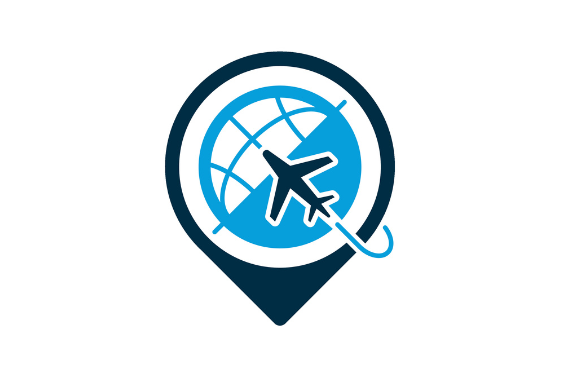
Travellers Online
Travelling abroad? Register now!
Useful links
- National Crisis Center
- FPS Public Health
- FPS Economy
- Tropical Medicine in Antwerp (Wanda)
- European Union
- World Health Organization (WHO)
- Reopen.europa.eu
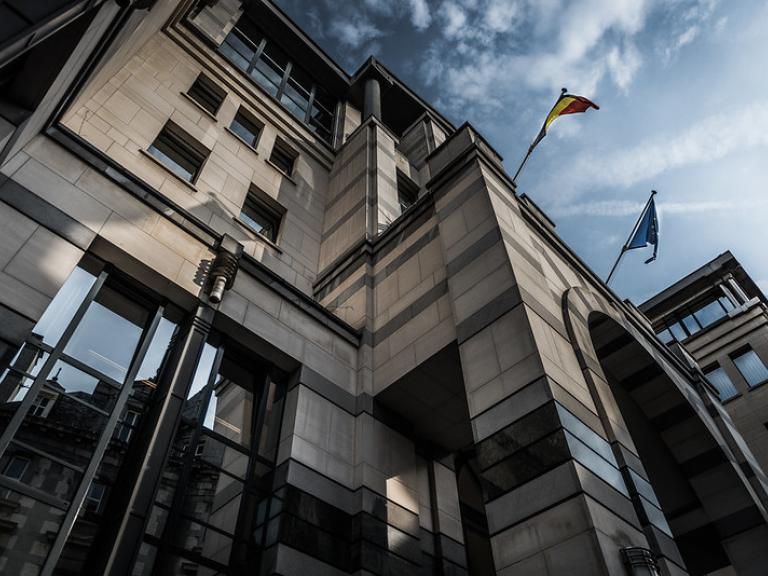
Embassies and consulates
On this page you will find the addresses of Belgian embassies and consulates abroad, as well as the addresses of foreign embassi...
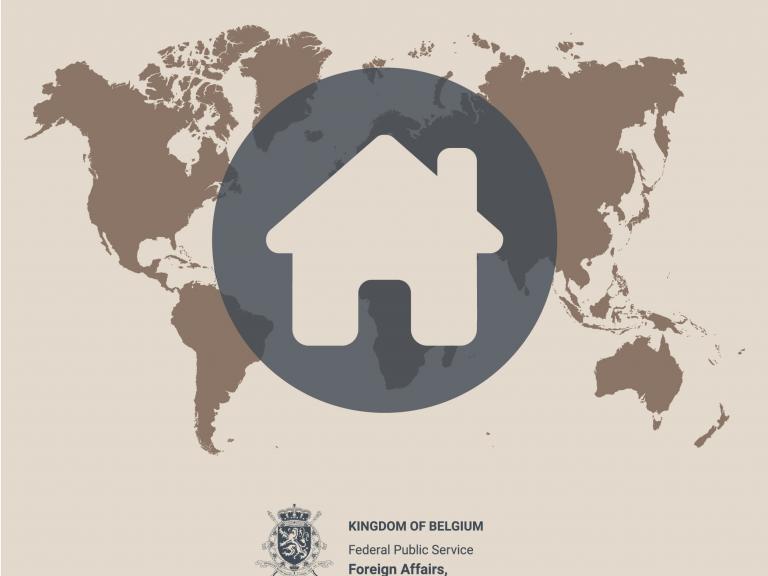
For Belgians abroad
On this page you will find all consular information if you are Belgian and live abroad.
© 2024 FPS Foreign Affairs, Foreign Trade and Development Cooperation
- Meet the Team
- Work with Us
- Czech Republic
- Netherlands
- Switzerland
- Scandinavia
- Philippines
- South Korea
- New Zealand
- South Africa
- Budget Travel
- Work & Travel
- The Broke Backpacker Manifesto
- Travel Resources
- How to Travel on $10/day
Home » Europe » Belgium » Brussels
Is Brussels Safe for Travel? (Insider Tips)
Brussels isn’t just the home of the “French” fries, waffles, beers and chocolate: it’s a stunner of a city with a ton of history wedged in between its winding cobbled streets. Gothic architecture juts up from the Belgian capital in a literal smorgasbord of fascinating fun.
However, whilst you’re exploring this European capital city and its historic best-bits, there’s a chance you might fall foul to something that is a more than just a little bit of a problem for visitors to Brussels: pickpockets. Also, there have been terrorist attacks in recent years. Being the EU capital city, Brussels is a target.
If you ever wanted to know how statistically safe Brussels is, or just wanted to know what the deal is with the safety on this city’s public transport, we’re happy to say that you’ve come to the right place!
You’re about to delve into a truly in-depth safety guide to Brussels where you’ll find important information as well as insider’s safety tips for just about anyone, from solo female travellers to families, so everyone can travel smart here and stay safe in Brussels.

Unlock Our GREATEST Travel Secrets!
Sign up for our newsletter and get the best travel tips delivered right to your inbox.
How Safe is Brussels? (Our take)
Is brussels safe to visit (the facts.), is it safe to visit brussels right now, brussels travel insurance, 20 top safety tips for traveling to brussels, keeping your money safe in brussels, is brussels safe to travel alone, is brussels safe for solo female travellers, is brussels safe to travel for families, is it safe to drive in brussels, is uber safe in brussels, are taxis safe in brussels, is public transportation in brussels safe, is the food in brussels safe, can you drink the water in brussels, is brussels safe to live, how is healthcare in brussels, faq about staying safe in brussels, final thoughts on the safety of brussels.
With all its Art Nouveau architecture, famous fountains, famous food, and lots of beer besides, Brussels is most certainly a European capital you should be considering on your hit list.
However, this walkable city doesn’t come without its issues. We’re talking petty crime. Everything from con artists to pickpockets roams the streets around busy tourist sites and transport hubs.
The crime rate, in general, may well be low, but there are definitely things you can do to avoid being targeted by petty criminals (we’ve got tips for you later!). Brussels boasts a few sketchy areas that you might want to steer clear of at night time.
There’s also a threat of terrorist attacks. Public transport and busy areas have been (and therefore could be) targets.
All that said, Brussels is a pretty small city of around 1 million inhabitants . Crime is generally pretty low and easy to avoid. Let’s get down into the nitty-gritty!
There is no such thing as a perfect safety guide, and this article is no different. The question of “Is Brussels Safe?” will ALWAYS have a different answer depending on the parties involved. But this article is written for savvy travellers from the perspective of savvy travellers.
The information present in this safety guide was accurate at the time of writing, however, the world is a changeable place, now more than ever. Between the pandemic, ever-worsening cultural division, and a click-hungry media, it can be hard to maintain what is truth and what is sensationalism.
Here, you will find safety knowledge and advice for travelling Brussels. It won’t be down to the wire cutting edge info on the most current events, but it is layered in the expertise of veteran travellers. If you use our guide, do your own research, and practise common sense, you will have a safe trip to Brussels.
If you see any outdated information in this guide, we would really appreciate it if you could reach out in the comments below. We strive to provide the most relevant travel information on the web and always appreciate input from our readers (nicely, please!). Otherwise, thanks for your ear and stay safe!
It’s a wild world out there. But it’s pretty damn special too. 🙂
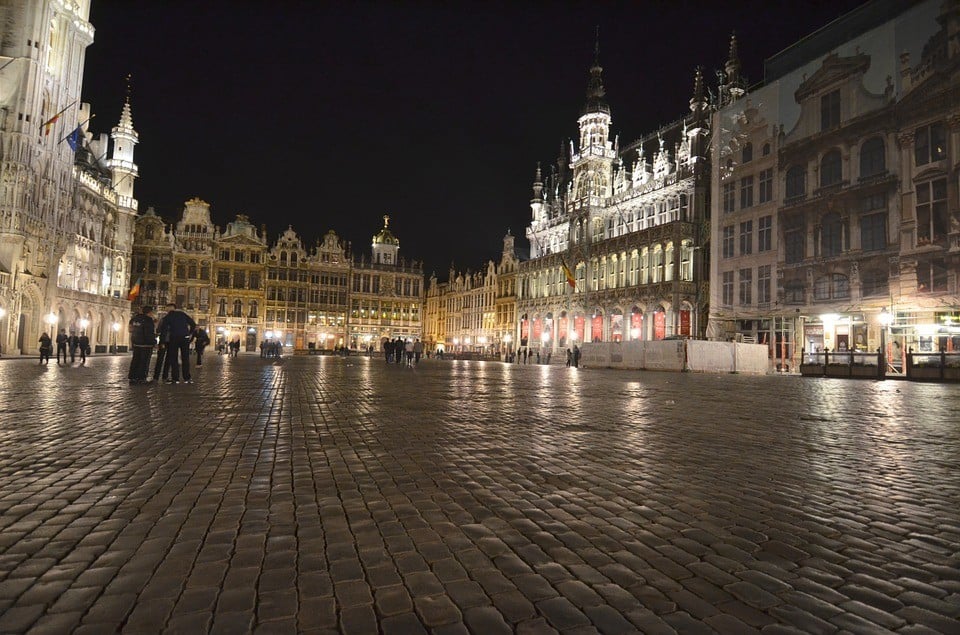
The Broke Backpacker is supported by you . Clicking through our links may earn us a small affiliate commission, and that's what allows us to keep producing free content 🙂 Learn more .
Brussels is basically (but not actually) considered something of a “capital of Europe” since it’s where a load of the EU buildings are located; NATO buildings, European Commission and foreign embassies abound, too. However, there is still crime here.
In 2018, most of the crime in Brussels occurred in the City of Brussels – the very centre of the capital. Grand Pace, Quartier Nord, Mantonge as well as the Porte de Hal and Brabant have the highest crime rates.
Overall, however, crime, in general, has fallen by around 20% in Brussels over the past decade; that’s with an increase of 15% of the population.
Having said that, compared to the second largest city of Belgium, Antwerp, Brussels has 20% more crime.
2016 brought difficulties for the city, and the country as a whole, as terrorist attacks occurred during this year. But this hasn’t deterred tourists from visiting: in 2018 tourist numbers increased by 2.2% on the previous year.
Finally, if you look at the good ol’ Global Peace Index, Belgium sits happily at 18st (out of 163 countries) – that’s between Mauritius and Slovakia.
At the moment, Brussels is safe to visit.
However, it’s important to note that demonstrations occur quite frequently in the city. These happen mostly around the Schuman area and near transport hubs. Usually, these are peaceful, but there can be incidences of violence; they can also cause travel disruption around the centre of the city. It’s best to stay away from demonstrations and big gatherings.
It’s sad to say also that repeated, coordinated terrorist attacks (the most recent being in November 2018 ) have affected the city. These have occurred at the Brussels Zaventem Airport, as well as the metro and Brussels Central Station.
The heightened risk of a terrorist attack means that you should be vigilant, and understand what you should be doing in the event of one taking place.
Because of this, security operations by the police can take place at short notice. The public has been asked not to share these operations on social media, for obvious reasons.
On the whole, however, Brussels is safe to visit right now. It’s just important to be aware of the issues currently facing the city (like anywhere).
ALWAYS sort out your backpacker insurance before your trip. There’s plenty to choose from in that department, but a good place to start is Safety Wing .
They offer month-to-month payments, no lock-in contracts, and require absolutely no itineraries: that’s the exact kind of insurance long-term travellers and digital nomads need.

SafetyWing is cheap, easy, and admin-free: just sign up lickety-split so you can get back to it!
Click the button below to learn more about SafetyWing’s setup or read our insider review for the full tasty scoop.
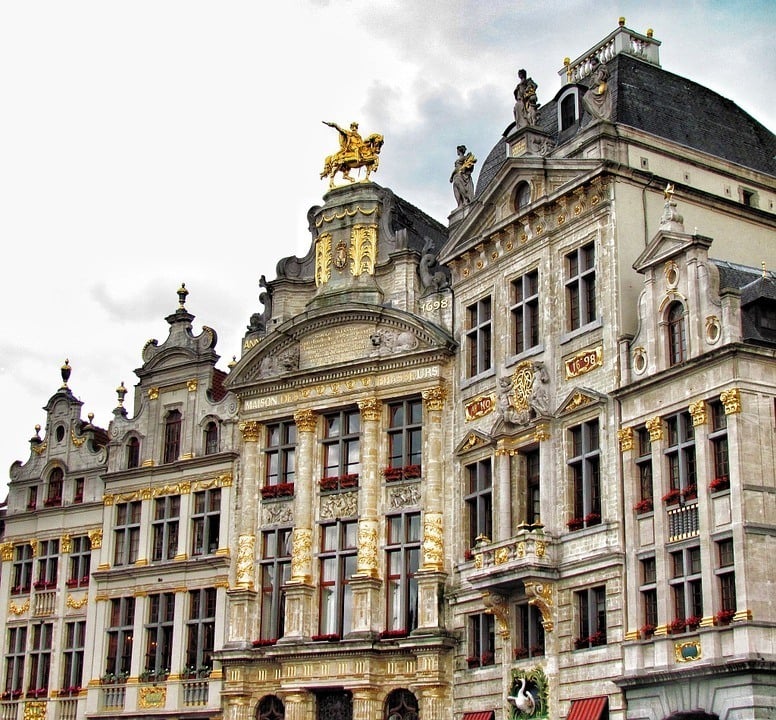
Brussels is generally a safe place to visit. It’s as safe as other European capitals, if not safer, but it also faces the same sorts of issues that many other places face as well. Pickpocketing, scams, distraction techniques by con artists and petty criminals mean that your trip could end turning sour, so we’ve put together our best safety tips for travelling to Brussels so you can enjoy your time here totally trouble-free.
- Leave your valuables at home – everything from flashy watches to wads of cash is safer in your room… or in your money belt .
- Don’t carry all your important stuff either – take copies of passports/IDs, and limit the amount of credit/bank cards you carry.
- Be careful around big railway stations – especially late at night – it is crawling with people who want to rob your stuff!
- Avoid stations like Brussels Gare du Midi / Zuid Station (the Eurostar Terminal), as well as Gare du Nord and Schuman ; petty criminals operate at these places in particular.
- Other places should be avoided at night – Brussels North, Annessens, Schaerbeek, St Josse, Anderlecht, Marollen, Malenbeek – all dodgy after dark.
- Watch out for distraction techniques – asking for directions, high-fiving you, pretending to ‘tackle’ you (i.e. football), throwing things on the ground – it happens a lot.
- Keep aware of overly friendly people – something, they are not actually friendly.
- Careful of your luggage on high-speed trains – don’t leave stuff on the racks; it’s known to disappear just before the train leaves.
- Post-nightclub fights do happen – it can get pretty rowdy. Keep yourself to yourself and don’t hang around: head home!
- Try to blend in with what you wear – if you stand out as a tourist you will be more of a target.
- Be aware of your surroundings at ATMs – keep a note of who might be watching you.
- Avoid taking cash out of ATMs at night – it becomes a significantly sketchier task so best to avoid.
- Know where you’re going – Brussels may well be easily walkable, but there are still a lot of streets. Best not get lost and find yourself in the wrong part of town (see points 4 and 5) at the wrong time of day. Make sure you know where to stay in Brussels before you book your accommodation.
- Keep belongings close to you – dangly bags, phones in back pockets, SLRs round necks – all easy to snatch
- Put bags under the table between your legs – even in restaurants, not just on the terrace. Things can get stolen.
- Get yourself a sim card – having data on your phone can make travelling around (and enjoying) a city much easier to do
- Learn some French (or Dutch) – most people speak French in Brussels, some speak Dutch (well, Flemish). A lot of people will understand English. But it’s still nice to have some of the local lingo down, if not just for restaurant menus!
- Be careful of what taxis you get – more on that later!
- Use public transport to get home after dark – walking could be dodgy.
- If you’re worried about terrorism… – visit the Belgian Crisis Centre website for more information
So there are a few tips on how to stay safe in Brussels. The most you’ll likely have to worry about is pickpockets; these pests are notorious for stealing people’s cash in the capital, so making sure that you don’t stand out, that you’re not carrying all your precious belongings, and that your stuff isn’t easily steal-able are all things you should be doing. Travel smart – that’s the bottom line here, people.
Just about the most annoying thing that can happen to any world traveller is losing money and nobody wants that – ever. It’s a great way to put a dampener on a trip and it can even put a stop to your travel plans.
In Brussels, there’s a definite worry of having your cash-pinched by a pickpocket. These things really can happen here. With that in mind, there’s one simple solution we’d like to share: money belt.
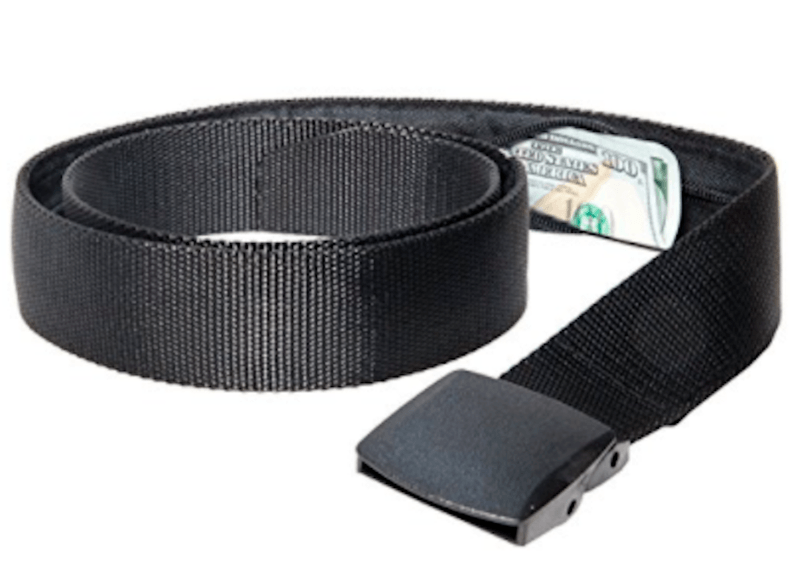
Start googling though and you’ll find a literal ton of choices to wade through, some ok, some not ok, but most of them pretty complex and just not what we’d call economical. The Pacsafe Money Belt is our best bet. It’s affordable, it looks and acts like a belt, and it’s sturdy – what more could you ask for out of a money belt!
It’s affordable, it’s rugged and sturdy, it’s simple – just one zip pocket conceals your hard-earned money! Easy.
In Brussels, there are pickpockets and petty criminals to watch out for. Even if you end up letting your guard down for just one moment (it can happen, no matter how well prepared and street smart you are) the best thing for it is a money belt. It’s honestly the most simple way to not have stuff – namely money – stolen from you. Keep your cash in a money belt and keep your pockets free of steal-able stuff.
If you need a little more room for your passport and other travel valuables, have a look at a full-size money belt that tucks under your clothes instead.
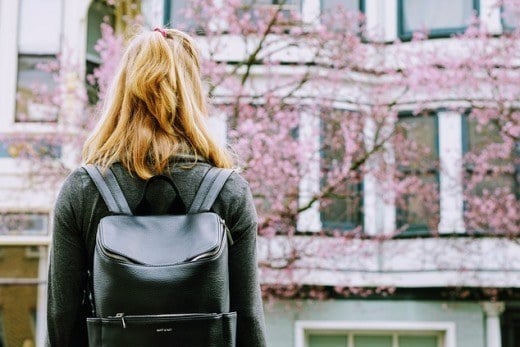
Travelling solo is pretty awesome. You get to grow as a person, challenge yourself and see the world while you’re doing it. Sounds like a blast, right? Add to that the opportunity to meet some cool people and it can be an amazing experience. It’s not all roses, though.
Sometimes the ‘solo travel blues’ can rear its ugly head – a combination of getting lonely and jaded with time spent by yourself in different countries. Brussels is a safe city to explore, but here are some tips for solo travellers in Brussels to make it safer and to keep you grounded.
- Make sure you pick well-located accommodation. Be careful of hostel descriptions saying they’re “centrally located” – it may be “central”, but it may also be in a sketchy part of town (especially at night). Definitely do your research when it comes to social hostels, hotels, and guesthouses.
- Read reviews of hostels and places that you’re thinking of staying. Read comments that have been left by other solo travellers to see if it’s really all that good for people travelling by themselves. This is the best way to find something that’s best for you.
- Take a walking tour around the city. Brussels is pretty small, so a walking tour will be a nice way to get to know what’s going on. Not only is this going to be a cool way to get to know the city streets, but you may also get chatting with some fellow travellers. Always good if you end up on a walking tour organised by your hostel!
- Walk around the city instead of taking the Discover Brussels card. Purchasing it means that you can travel across the entire network for 48 hours, however, it’s not worth buying. You can walk around the city easily. And when you do need to use public transport, it’ll most likely be one journey each day – at night!
- Research what you want to see and do when you’re in the city. You might end up leaving a little deflated if you just hit up the top sights, so read around for the best things to do in Brussels.
- For authentic recommendations on what to do in Brussels, ask locals. The staff at your accommodation is a good place to start. Most likely they’ll know some hidden gems and off the beaten track things you could be getting up to in the Belgian capital.
- Use one of the Villo! bikes. You can pick these short-term rental bikes up from one of the 180 stations located around the city and pedal it around to your heart’s content; it’s a pretty good way to get around!
- Don’t forget to keep in touch with people back home. Not only is this a good way to stay grounded and in touch with the real world, but it’s also safer if your friends and family know what your travel plans are, i.e. where you are and what you’re up to.
- Don’t be a dummy and pack all your cash and bank cards into one bag; if that goes missing, you’re stuffed. Spread your valuables around, don’t lose them, and you may even want to consider bringing an emergency credit card – just in case, you know. For your cash, take a money belt.
- Finally, Brussels is a fun place to party, but try not to get too wasted – it can be pretty dangerous doing that. Not only can the city’s drinking and partying establishments get pretty rowdy after closing time, but being completely drunk isn’t a safe way to get yourself home. It means that you’ll be putting yourself into (sometimes stupid) situations you wouldn’t be in otherwise.
Don’t let the pickpockets and petty crime put you off visiting Brussels: it’s a fun city to explore. You may be doing it by yourself, but the city is small and walkable, so you’ll be getting to wander around at your own pace without having to worry if anyone else in your group is getting hungry. That being said, there’s no one else to watch your back, so keep your common sense intact, keep in touch with people, and stay safe!
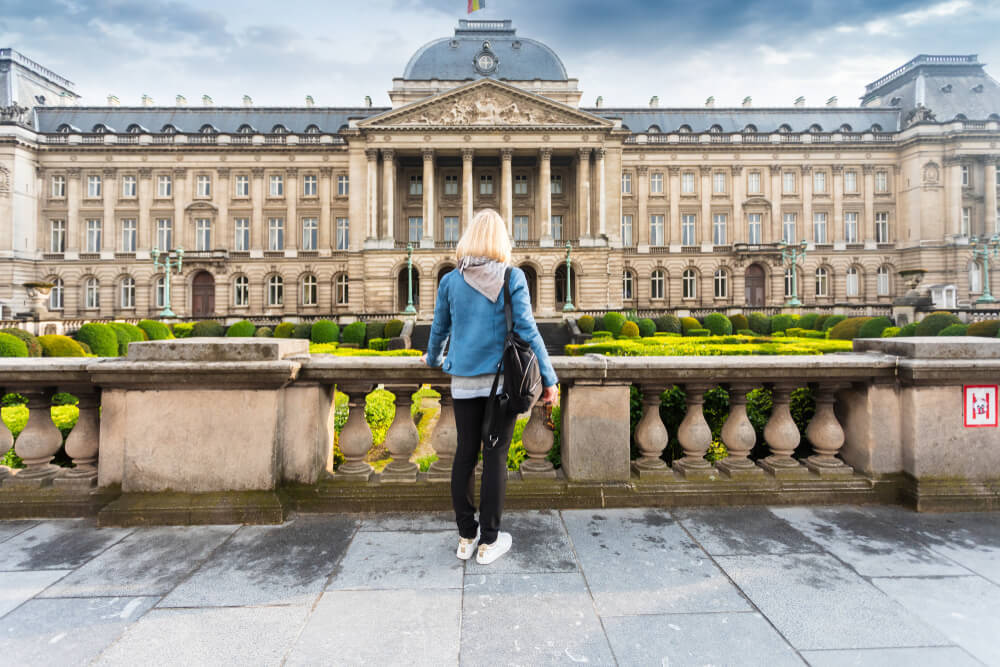
Like a lot of places in Europe, Brussels is safe to travel as a solo female traveller. However, you’ll probably still have some concerns about your trip to the city. What are you going to do? Who are you going to meet up with? Will you be lonely? All these worries (and more).
To help you out we have got together a list of our best tips for solo female travellers in Brussels. It may be a safe city, but travelling by yourself has its own issues; travelling by yourself as a woman comes with even more risk, too, but don’t you worry – we’ve got it covered.
- Book yourself into accommodation that’s good for solo female travellers. The best way to do this is to read reviews that have been written by other solo female travellers. If they’re positive and favourable, it’s probably a decent place to stay. Book yourself into a female-only dorm and get chatting with other like-minded people; you may find yourself a drinking buddy!
- Be open-minded when it comes to getting to know other people. Ask other solo female travellers if they want to go grab a coffee, go visit a cool restaurant, whatever. You’ll be surprised just how easy it is to meet other people who are in the same boat as you.
- Other than hostels, other good places to meet solo female travellers include Facebook groups like Girls Love Travel. Get yourself on the group and see if anybody else is in Brussels the same time you are.
- Don’t be afraid to join in the social activities at the hostel or accommodation you’re staying at. Get involved in pub crawls and walking tours, of course, but also don’t shy away from chilling out in the social areas to meet and mingle with other travellers staying there.
- You don’t need to worry too much about what you wear in Belgium, let alone Brussels. However: pickpockets will target people who look like tourists. So take a look around you and see what the local ladies are wearing. Try to follow suit, rather than wandering around in activewear and walking shoes.
- Know how to get home if you’re heading on a night out. The Red Light District near Gare du Nord, for example, is a hotbed of sex workers and drugs and is not the ideal place for a solo female traveller to be wandering around lost after dark. If in doubt, get a taxi.
- Don’t walk around poorly lit areas at night time. In fact, you might just want to avoid walking around at night at all . With this in mind, don’t blindly follow your Google Maps route home – it could take you on a sketchy shortcut. Stick to the main streets.
- Ignore and move on if you stumble across groups of men who might catcall. Maybe more likely to happen at night time, and more than likely in some of the city’s sketchier areas.
- Keep an eye on your drink – drink spiking can happen, so keep hold of it. To be extra safe, don’t let strangers buy you drinks.
Like in most other European cities, you’re going to be generally pretty safe as a solo female traveller. Then again, being a female traveller, you will have other risks to watch out for – as you would anywhere. The thing to remember here is common sense.
That means just doing things you would do at home: not falling for scams in the streets, not getting chatting to weirdos in the streets or out at night, not walking home through dodgy areas after dark… All this and more are things you probably already do at home anyway.
Watching out for any potential dodginess aside, you’re going to have an awesome time in Brussels. It’s a fun city to explore since it’s easy to wander around. However, it’s still a city and cities can get lonely. Make friends with fellow travellers, meet up with people, enjoy.
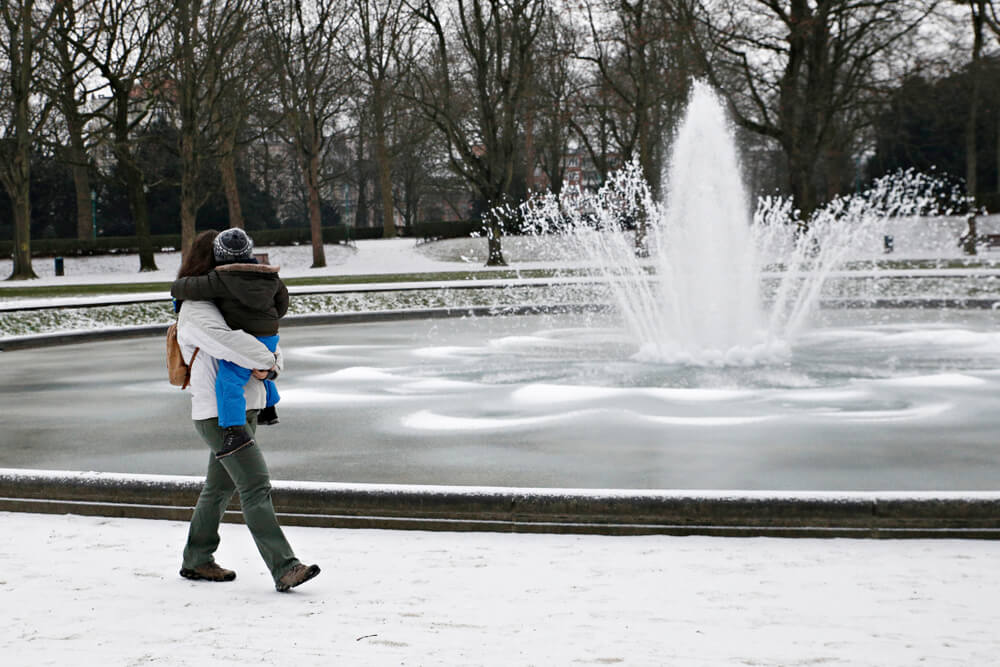
Brussels is very used to families visiting and, as a result, is a safe place for families to travel.
First things first: you can often find family rooms at hotels in Brussels. That’s a pretty handy thing, but even handier is the fact that younger children quite a lot of the time stay for a reduced rate, which is awesome – especially if you’re on a budget.
There’s also plenty to get up to that will keep your kids entertained whilst you’re there, too. Start with the famous peeing statue, Manneken Pis and look out for his daily outfit changes, which are all on display at the Museum of the City of Brussels.
Other things to keep you (i.e. your children) out of trouble is the Museum of Natural Science – there’s a ton of information here, and dinosaurs. What small person doesn’t like dinosaurs?
Being a chocolate-y city, there’s chocolate making workshops to get involved with. Maybe you won’t want to do this with your kids actually, because they may go insane.
There’s a lot of cool medieval buildings to generally enchant you and your children though, which is always nice. Another plus is that, unlike other “pretty” European capitals like Paris or Rome, Brussels is much more chilled out and much less stressful; the pace of life is less frantic and there are fewer people around, making it an easier place to take children.
If you’re planning on going out of season (not summer), Brussels will be even quieter. Just make sure you wrap up warm.
You won’t have to worry, at all, about picking up things like nappies, formula, baby food, any other children-based supplies; it’s a family-friendly city and there’ll be shops everywhere selling this kind of thing.
One thing to note: children in Brussels are pretty well behaved. You won’t see many kids running around screaming, so you may want to limit how much your own children do that.
It’s also probably not a very good idea to take your own pram with you. Cobbled streets and steps don’t make for a very pram-friendly environment, so you may want to don a sling if you’re planning on taking a toddler.
Basically, Brussels is 100% safe to visit with children, no doubt about it.
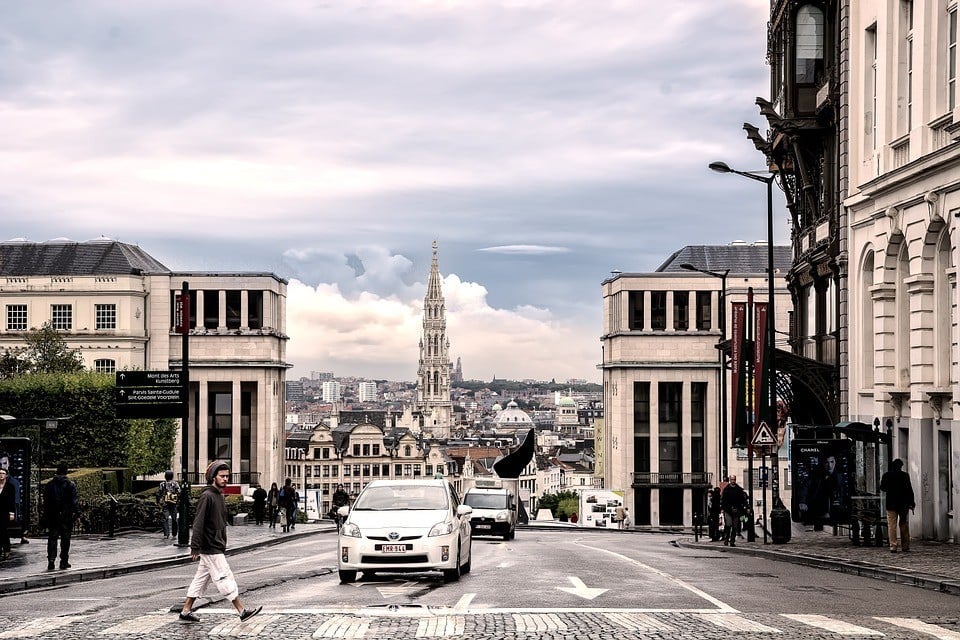
It may be safe to drive in Brussels, but we wouldn’t say it’s a great idea.
Unless you’re planning on a road trip driving in Brussels will end being a pretty pointless and very expensive exercise. It can get jammed with traffic, there’s a bit of speeding, lots of one-way streets and parking is pricey; those are just a few reasons.
More alarmingly, the road-related death rate in Belgium as a whole is almost double that of the UK.
If you do end up renting a car and driving yourself around you need to be really careful of where you park your car. You need to basically not keep anything valuable in your car – like, ever. Break-ins are not uncommon and thieves have sometimes even grabbed valuable-looking stuff from cars through open windows at traffic lights, so keep those rolled up! Make sure you also purchase solid rental insurance before you hit the road.
You also need to be aware that the city has a low-emission zone in the centre, which limits what sort of vehicles – and how many – can actually enter the “zone”.
Traffic can be very speedy in the city. There’s that to watch out for, but then again you shouldn’t speed yourself. There are a lot of unmarked speed cameras and the fines, if you’re caught, are pretty dang steep.
Trams (which we’ll talk about in a bit) take priority over other traffic. Not stopping for trams is dangerous. If a tram stops, you stop.
You’re not allowed to drink alcohol and drive, obviously, and using your phone whilst driving is stupid too – as well as illegal.
What we’re saying is that driving in Brussels isn’t worth it. It can be scary, unsafe and end up costing you a lot of money. There’s a perfectly good public transport system in place so, if you’re planning on staying in central Brussels , then don’t bother with your own wheels.
Cycling in Brussels
Brussels is a beautiful city, which is best discovered by bicycle. You can decide your own tempo and ride wherever you want. Lots of Brussels citizens are skipping their car or public transport. Riding your bike through the city, to work or just to meet up with friends has almost become the new trend.
But is it safe? Generally speaking, riding your bicycle is pretty much the fastest and safest way to get from A to B . Of course, there are always exceptions, but if you stick to the rules, the worst-case scenarios become really unlikely.
Especially with the rise of the e-bikes, wearing a helmet has become one of the most important precautions when cycling around the city. Technically, this is not mandatory, but you’re better off safe than sorry.
Brussels has developed a well-connected bike lane network . There are a couple of panoramic paths that you don’t want to miss out either. To get more information about the bicycle map and traffic rules, you can check out the City of Brussels page .
There are two ways to get your hands on a bicycle:
- rental shops: choose your type of bike and explore the city. This comes in handy when visiting the city for the first time since your rental can give you an introduction and tips.
- bike-sharing: there are over 300 bike stations in Brussels, and all you need to do is download an app, find a bike, pay online, and you’re good to go. You’ll pretty much find them around every corner.
Uber exists in Brussels and it is, like Uber around the world, safe.
It works the same as it would in any other country, connecting you with a driver in mere seconds. You can pay through the app, track your journey, and all the other useful stuff that makes Uber so beneficial.
There’s nothing more to say other than to reiterate that Uber is safe in Brussels… and much cheaper than taxis.
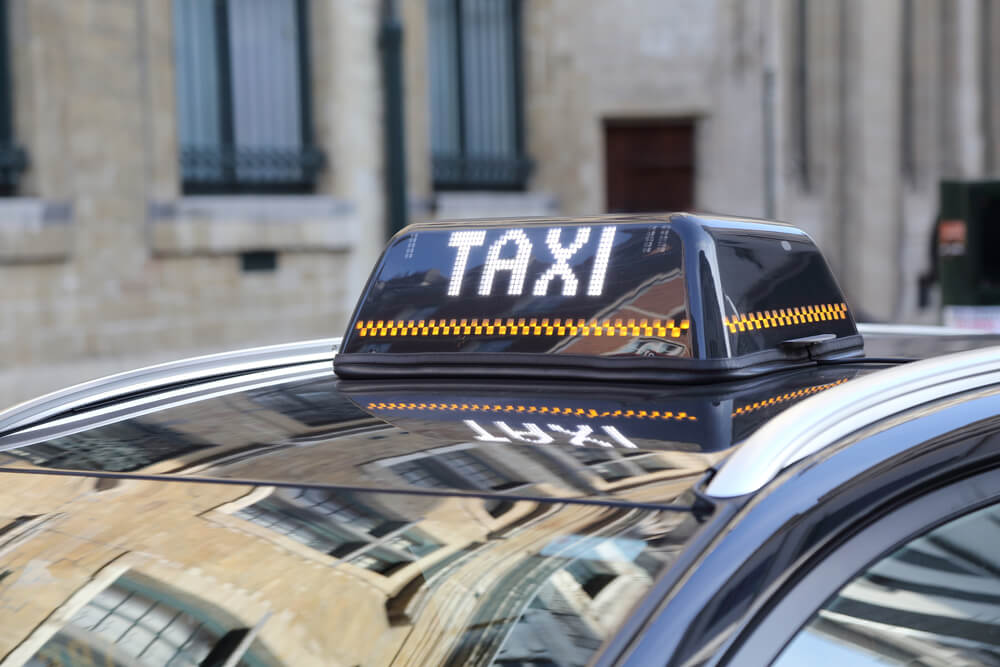
We’re not going to lie: the taxis in Brussels are some of the most expensive in Europe.
On top of that, the only “safety” issue you’re going to have with them is being overcharged – even more!
The base fare for taxis in Brussels isn’t that expensive, really (2.40 Euros): it’s the price per kilometer (1.80 to 2.70 Euros) that really racks that meter up, and that’s without mentioning additional surcharges for things like luggage and waiting time.
Licensed taxis are usually black, or white, and will have a “TAXI” sign on the roof.
The taxis should always use the meter – and you should always pay the price that’s on the meter! No questions!
You can find taxis at taxi ranks outside places like train stations, big hotels and top sights like the Grand Palace. Alternatively, you can ask at your accommodation for the number of a reputed minicab company.
Another thing: the taxi drivers in Brussels have a bit of a reputation for being slightly aggressive and driving a little too fast. If you’ve had a driver that you’ve been really dissatisfied with, you can report them; just make a note of their 4-digit taxi ID and you can make a complaint about them.
Mostly the taxis in Brussels are safe, just sometimes the drivers are a little bit unscrupulous.
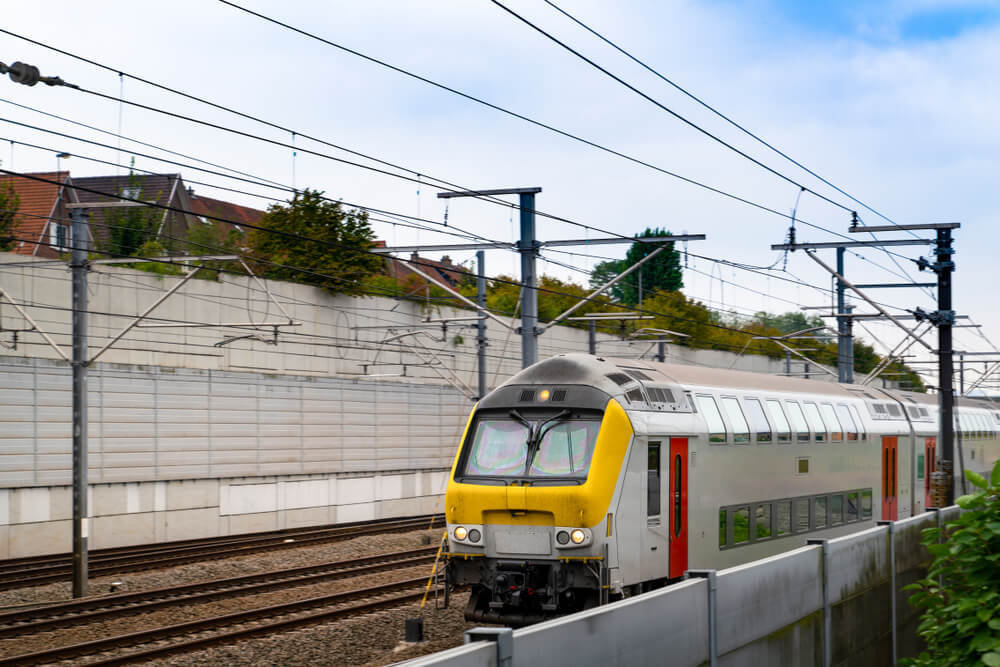
Hands-down the public transport is the best way to get around Brussels. It’s quick, cheap and efficient – for the most part.
Safety-wise, there are some issues with pickpockets around some of the major stations, but generally, it’s pretty safe.
The metro was opened in the 1970s and encompasses 6 lines. However it doesn’t actually cover that much ground, so using the metro alone isn’t actually the best way to get around the city. It opens from 5:30 am till midnight during the week, 6:30 am till midnight.
Buses, on the other hand, are a pretty all-round decent way to get around the city – especially considering that it goes to places that the metro just doesn’t reach. They’re especially good if you want to traverse Brussels after dark: night buses run on Friday and Saturday from 12:15 to 3 am.
There are loads of them, they arrive every 30 minutes and they cover many of the city’s main streets. If you’re worried about any rowdy behaviour on the bus (which can happen) just sit close to the driver.
Then there’s the tram system. It’s got quite a claim to fame: Brussels’ tram lines, all 17 of them, make up one of the largest tram networks in the world.
It’s open from 6 am till midnight, runs past many of the city’s top attractions, and runs over as well as underground.
Trains are a good way to travel around Belgium as a whole. In fact, you may arrive in Brussels on a train (if you’ve caught the Eurostar, for example). If you arrive at the Eurostar Terminal, definitely be aware of your belongings and surroundings; this area of town really isn’t the nicest and is known for pickpockets operating in and around the station. Be careful of your baggage, too, and don’t fall for distraction techniques.
To sum up: Brussels’ public transport is safe. However, your money may not always be safe, so ensure vigilance especially in busy stations.

French fries, mussels, beer, chocolate, waffles: these are some of the tastiest, most iconic treats that will be in store for you if you plan on heading to Brussels anytime soon. Chocolate fiends, however, should make a beeline straight for Neuhaus, a 150-year-old chocolatier.
More chocolate can be found at Sablon ; all the major chocolatiers of the city have a shop here. You can’t subsist solely on chocolate alone, even though we wish you could, so here are some pointers for exploring the culinary scene of Brussels whilst keeping your tummy safe.
- Do not go to the Rue de Bouchers. We repeat: do not. This is where you’ll find some of the worst restaurants in Brussels. Weirdly, they’re all geared towards tourists, but they’re all so bad – we just don’t get it. They’re overpriced, the owners are pushy, and the food is really not up to standard.
- With that in mind, really do steer clear of tourist traps. If you head to a restaurant boasting an extensive menu, in English, with someone outside trying to get you in, it’s most likely you’re about to enter a tourist trap. These are more about making money than actual good food.
- If you are going to try local food, then go somewhere that’s actually busy with local people. A good way to tell if they are locals is to listen: if they’re speaking English, it’s probably for tourists. The best thing about local spots is that you get to experience an undiluted experience of eating in a city.
- As we said, moules frites (mussels and fries) is something you have to try. However, they’re not available all throughout the year. Eat them in season, between September and February. Don’t eat any dodgy mussels whose shells haven’t opened properly in the cooking process (this means they were already dead before cooking). You do not want to get ill from seafood: it’s nasty.
- Hit up the waffle shops. Keep it simple: less is more. Steer clear of all the whipped cream and various toppings you can get – this is for tourists – and opt for a classic, minimalist waffle for the real taste. The tourist versions are called gauffres and sometimes you get a mini Belgian flag stuck in them for extra tackiness. You can get the real local ones from small waffle buses parked on the streets.
- Go for food that’s cooked hot and fresh ; the street food in Belgium, in general, is amazing, but make sure you eat from a clean-looking stall where you can see stuff being cooked before your very eyes. The thing about pre-cooked food, on the other hand, is that you just don’t know how long it has remained unsold.
- Make sure that you wash your hands. Exploring a city can make your hands deceptively dirty, so do make sure you give ’em a scrub before you eat – especially if you’re eating with your hands.
There you have it, folks! There is a whole lot of tasty food for you to stuck in to in the Belgian capital. If you are really worried about where you are going to eat, then we would recommend reading some reviews of top-rated places to eat in Brussels on sites like TripAdvisor.
Other than that, food hygiene is pretty good in Brussels. Just make sure that you really do avoid tourist traps, not just they’re low-quality everything and not “real” Belgian food, but also because they are expensive . Eat local, go where locals go, and you’ll love it here.
Of course! The tap water in Brussels is safe to drink.
It’s actually pretty good – as far as tap water goes, we mean. That said, it does contain higher levels of lead than it should do – that’s because of all the old pipes. It’s an old city, after all.
However, that’s only in 2% of 900 water samples. If you want to stay extra safe, or don’t like the taste, use water filters to fill up your refillable bottle where possible (at your hotel or hostel) or if you’re really paranoid, you could always buy bottled water. Read our in-depth review of the best travel water bottles here if you decide to buy a refillable bottle.
For the most part, however, it’s good to go – drink the water in Brussels and be merry.
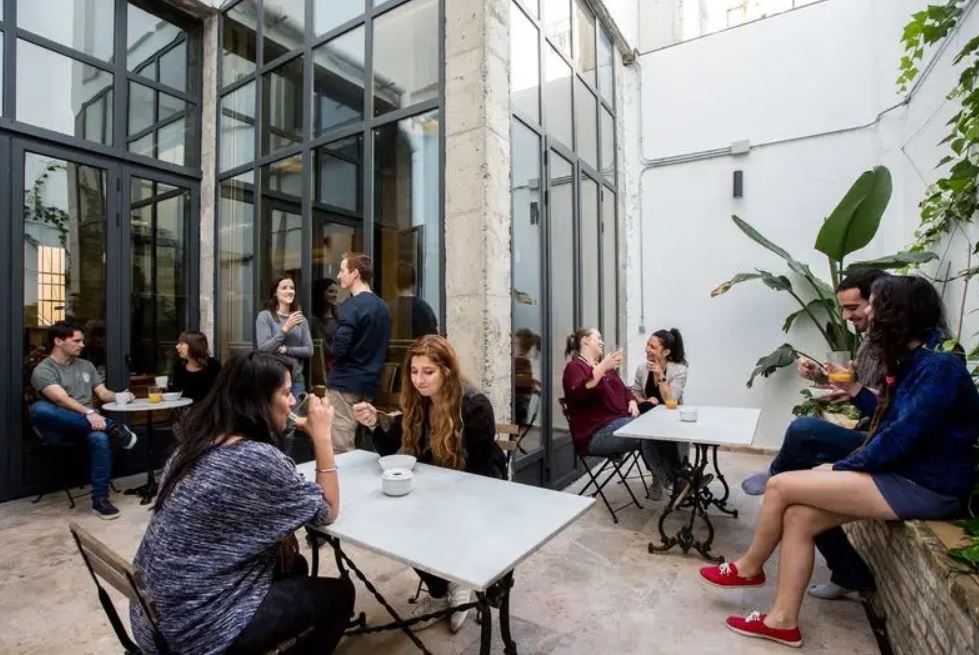
Brussels is a pretty safe city to live in. Being a sort of unofficial hub for Europe in general, there’s a pretty international mindset here that’s generally quite welcoming of outsiders.
That being said, some outsiders aren’t very friendly – as proven by some of the terrorist attacks that have taken place within Brussels over the past few years. Obviously, there is a threat of terrorism, but it’s nothing you can do much about: just go about your daily business as you would and as Belgians do.
Another thing that makes it a little bit of an unsafe place to live in is the traffic. The streets are often clogged, parking is a mess, and – as we mentioned – the road-related deaths in Belgium are pretty high.
When it comes to specific areas in which to live in Brussels, we would recommend Place Jourdan. This is a fun, friendly neighbourhood with its own little neighbourhood square; locals go about their errands, there are a lot of bakeries, a Sunday market. Place Jourdan is a quiet, safe place to live in Brussels.
However, if you are looking for something more exciting and diverse, check out the neighbourhood of Schaerbeek. There is a mix of cultures as well as architecture here, complete with things like banks, parks, great food, and good housing options.
The safest neighbourhoods overall though are to be found in Uccle, Ixelles and Woluwe Saint Pierre ; each one boasts fewer than 500 crimes reported per year. That sounds pretty safe to us.
Despite the high alert for terrorist attacks, Brussels is a safe place to live. There may be the risk of something happening, but this is the case in many European countries, and living your life in fear wouldn’t be a good way to go about things.
The best course of action is to just be sensible. There are, of course, areas to be aware of at night, too; chances are you won’t actually be going anywhere near them after dark, so you’ll avoid the petty crime that can occur.
As with all things, research is key. Talk to expats before you make the move, get local knowledge on good estate agents – things like that. As far as problems are concerned, there are no more or less than occur in other big, European cities.

A new country, a new contract, a new piece of plastic – booooring. Instead, buy an eSIM!
An eSIM works just like an app: you buy it, you download it, and BOOM! You’re connected the minute you land. It’s that easy.
Is your phone eSIM ready? Read about how e-Sims work or click below to see one of the top eSIM providers on the market and ditch the plastic .
Belgium boasts a state-run healthcare system which is apparently one of the world’s best. Most of it, as you’d expect, is to be found in the capital.
That means you shouldn’t have to worry too much if something happens to you whilst you’re in Brussels. A lot of staff at hospitals will speak English and will give a high standard of care.
If you have an emergency in Brussels, dial 100; an ambulance will come to collect you and will take you to A&E.
If you are an EU citizen you should have your EHIC card on you at all times – just in case. That’s because the healthcare system in Belgium, though state-run, is not free. Non-EU citizens will have to pay, of course, so you should definitely make sure you travel with health insurance or good travel insurance.
Pharmacies are frequent throughout the city; most of these operate normal working hours, but there are a fair few 24-hour options, too. The best bet for finding a good pharmacy is to ask the staff at your accommodation, who will more than likely be able to direct you to the nearest one.
At pharmacies, you can buy a bit of over the counter medication, and get advice from the pharmacists themselves, but you won’t be able to receive a prescription; for that, you need to see a doctor.
To see a doctor, for minor complaints and ailments, you can go to a walk-in centre or clinic. You don’t have to make an appointment, but you will have to wait; the time you wait will depend on how urgent or severe your case is. Note: you will have to pay upfront i n cash at one of these walk-ins/clinics – better head to the ATM beforehand!
Here are some quick answers to common questions about safety in Brussels.
Is Brussels safe at night?
Yes, Brussels is safe at night. Do keep in mind that the hours after dark can get sketchy no matter where you are travelling to. As long as you don’t randomly walk around alone at night or make it very obvious that you’re a tourist, you should be perfectly safe.
Is Brussels a safe place to visit?
Yes, Brussels is a pretty safe place to visit. Obviously, you can make your stay a lot riskier by walking alone at night or hanging around sketchy public transport stations, but the city is generally very safe.
What is the crime rate in Brussels?
The crime rate in Brussels is bang in the middle with 55%. That doesn’t make it incredibly dangerous, but not perfectly safe either. Use your common sense when you explore the city and be aware of your surroundings at all times and you won’t encounter any problems.
Is Gare du Nord safe?
The Gare du Nord station is safe when you use it during the day. At night, this particular area is known for crimes like assaults and robberies. If you’re a female traveller, we’d suggest staying away from this area at night ,or, if you really have to, stick with a group of people you can trust.
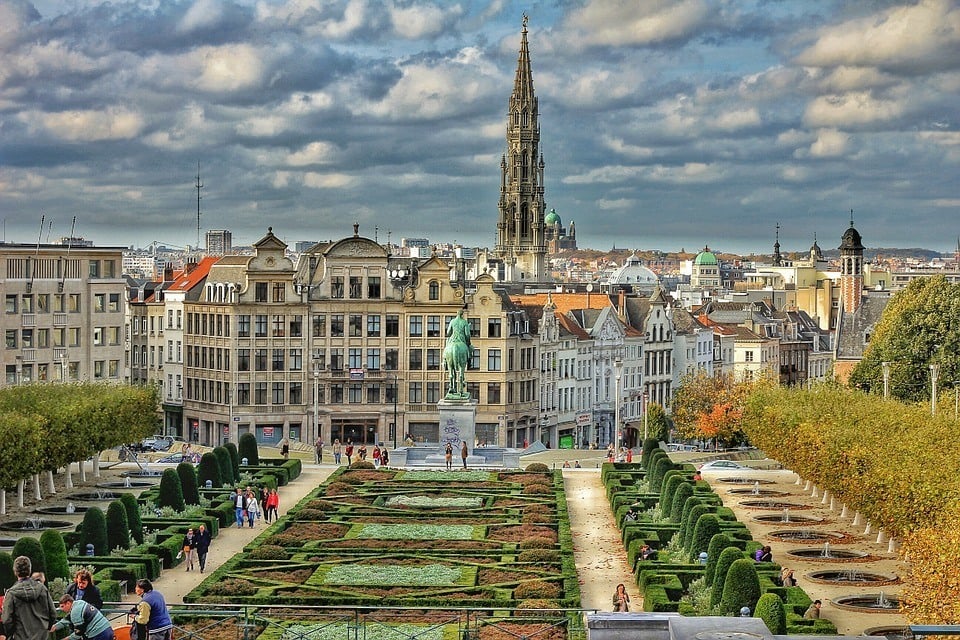
Though there may be sketchy neighbourhoods, a bit of petty crime, and even with the small threat of terrorist attacks, there honestly is nothing else to say apart from this: Brussels is safe. It’s safe to visit and you could even live there safely if you felt like it. Belgium itself is statistically one of the world’s safest countries; it’s up there with the top 20 most peaceful, according to 2019’s Global Peace Index.
Brussels, however, is where most of Belgium’s crime happens – it’s the capital city, so of course, there is going to be more crime here than in other parts of the country. Look at any European city: on the whole, it’s going to be considered safe. Then look at its capital: more often than not, it will have more of a reputation for being “rough” or “sketchy” or “dangerous”, which is only true for some areas in Brussels.
The best way to keep safe in the Belgian capital is to not be oblivious to your surroundings. Know that distraction techniques occur, that crowded areas like tourist sights and transport hubs attract petty criminals, that a terrorist attack could happen. Visiting Brussels without a care in the world and not considering any danger is likely to lead to it; be aware, travel smart, use common sense and you’re likely to avoid it.
Disclaimer: Safety conditions change all over the world on a daily basis. We do our best to advise but this info may already be out of date. Do your own research. Enjoy your travels! Some of the links in this post are affiliate links which means we earn a small commission if you purchase your insurance through this page. This costs you nothing extra and helps us keep the site going.

Mathilde Magnier
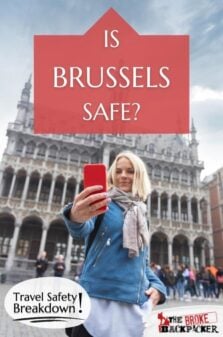
Share or save this post

Do not trust anyone on the trains in Brussels. Thieves ride the trains all day to rob. No CCTV cameras, no police presence at stations and nobody cares. Train staff say “yes this happens daily” and seems like there is absolutely no plan to keep people safe. We were just robbed (passport included) at Schuman (Bruxelles Nord – Luxemburg). We were so much happier taking the train into Strasbourg and other locations were trains have cameras, there is a police presence and also very visible emergency numbers posted in the train. Brussels seems too relaxed and it seems to be encouraging theft by not having any deterrents.
Writer described very well!! It is very safe, just be aware and dont trust everybody, like she said if someone is to friendly it is probably bc they want something from you, try to avoid and dont take random people to your airbnb or stay or tell them details. There is always people with bad intentions that might steal or try take advantage of you. In general is quite easy to see who is normal and who is not lets say but not always ? if someone weird is following you go away or go to public places. Even if you are a tough guy avoid any fight bc u might be surprised how many people can throw a high kick or takedown here and some are very crazy or have multiple people around to help them just in case. Also dont say anything bad about islam here because 23% of brussels is muslim and we respect that alot. The bars are very cool and u can find very cheap and good streetfood!! There is beautiful places and alot of fleemarkets or foodmarkets on sunday.
Leave a Reply Cancel reply
Your email address will not be published. Required fields are marked *
Save my name, email, and website in this browser for the next time I comment.
Notify me of followup comments via e-mail.

Why This Stunning Coastline Is The Most Underrated Beach Destination In Europe
Post may contain affiliate links; we may receive compensation if you click links to those products. This has no impact on how offers are presented. Our site does not include all offers available. Content on page accurate as of posting date.
Anyone with a passport has caught themselves daydreaming of European beaches, especially with Summer right around the corner.
Europe is jam-packed with stunning shores, but oftentimes, travelers tend to follow the crowds, playing it safe so they know what they're signing up for when splurging on a vacation.
That's not to say Europe's iconic beaches aren't worthy of a trip, but many still fly under the radar.
We're not talking about far-flung islands with 3 layovers to reach either.
There are some incredible beach spots hidden in plain sight and, better yet, offer direct flights from the U.S.
While many travelers seeking sun and sand will hit up Spain , Portugal, and Greece, among others, why not give Belgium a fair chance?
Easily reachable, and even overshadowed by the country's own cultural inland cities of Brussels and Bruges, Belgium's stunning coastline should be your next European beach vacation.
Belgium Is More Than Picturesque Canals And Cobbled Streets
How many times have you heard ‘Belgium' and ‘beach vacation' in the same sentence? Probably not a lot.
In fact, it's safe to say many travelers don't realize Belgium is a coastal getaway at all, being attracted to Brussels and Bruges like moths to a flame.
It's not that Belgium isn't popular, but this beautiful, historic country has never quite had a seat at the table with the likes of France, Spain, and the U.K., even as close as they are geographically.
Yet, Belgium is indeed an awesome beach destination with over a dozen resorts to choose from.
From the picture-perfect beaches of Du Panne bordering France to the scenic coastal town of Knokke-Heist bordering The Netherlands, it's time for Belgium's shores to take center stage.
One Of The Most Unique Ways In Europe To Find Your Beach
Speaking of Du Panne and Knokk-Heiste, traveling border to border is easy peasy with Belgium's 140-year-old Kusttram tram.
While certainly no epic European train adventure, beach-hopping around Belgium's quaint seaside is still a thrill for scenic sites and perfect photo-ops on the longest tramline in the world .
Taking vacationers the full 43 miles, this fun ride sure beats an Uber or dirty taxi ride! The tram is not just for going beach to beach, Belgium's coast is full of surprises.
Some notable stops along the journey are the Middelkerke Casino, German Second World War fortifications, and both the gorgeous Zwin Nature Reserve and Westhoek Nature Reserve.
With a total of 67 stops, tourists can enjoy a mix of urban sites and coastal gems perusing this highly underrated side of the country.
Don't Skip Ostend
Du Panne and Knokk-Heiste are much smaller beach towns compared to Ostend, which is the most sizable city along the coast.
Here, is a mix of beautiful beaches, nice hotels, and some unexpected historical experiences dating back centuries.
First being Fort Napoleon . Dating back to 1811, this preserved fort of historical significance is easy to reach by free ferry service and is open 6 days a week.
And despite being old, there are new developments nearby to grab a bit to eat, shop, or simply lounge at the beach.
Ostend is also home to the Mu.ZEE, which displays art from the early 1800s and stunning architectural marvels like the churches of St. Peter and St. Paul.
Americans Can Fly Nonstop To Brussels
Americans may not realize Belgium is far easier to reach than one might think. Usually not at the top of the list for a Euro-trip, Brussels can actually be your first stop.
Between New York City and Washington D.C., Americans can hop aboard Brussels Airlines for a direct flight to Belgium.
From here, Belgium's coast is super accessible with multiple trains under an hour and a half from the capital city.
Of course, Brussels, Bruges, and Ghent, among others, are incredible places to visit while here.
You can also take a nice city break before enjoying the underrated seaside.
Sam, our Lead Writer & Journalist based in San Diego has visited 30 countries and written over 400 articles with a focus on sharing his own travel experiences and shining a light on lesser-known gems.
↓ Elevate Your Travel↓
Sign Up Now For Travel Off Path Premium! No ads, VIP Content, Personal Travel Concierge, Huge Savings, Daily Deals, Members Forum & More!
SUBSCRIBE TO OUR LATEST POSTS
Enter your email address to subscribe to Travel Off Path's latest breaking travel news, straight to your inbox.
This article originally appeared on TravelOffPath.com
Opinions expressed here are the author's alone, not those of any bank, credit card issuer, hotel, airline, or other entity. This content has not been reviewed, approved or otherwise endorsed by any of the entities included within the post.
The post Why This Stunning Coastline Is The Most Underrated Beach Destination In Europe appeared first on Travel Off Path .


IMAGES
VIDEO
COMMENTS
Travel Advisory. July 26, 2023. Belgium - Level 2: Exercise Increased Caution. T. Reissued with obsolete COVID-19 page links removed. Exercise increased caution in Belgium due to terrorism. Country Summary: Terrorist groups continue plotting possible attacks in Belgium. Terrorists may attack with little or no warning, targeting tourist ...
OVERALL RISK: MEDIUM. Overall, Belgium is a safe country to travel to. Crime rates are low and anything happening to you on the streets of Belgium is unlikely. The only issue to keep an eye on, apart from being vigilant for terrorist attacks, is petty theft and pickpocketing.
Generally speaking, Belgium is a safe country with relatively low crime rates. For most travelers, the biggest risk is pickpocketing and bag-snatching in crowded areas. However, in recent years, there has been a rise in terrorist attacks across Belgium - travelers should exercise vigilance, particularly in Brussels, where international ...
Safety and security. Increase in drug-related violence. There has been an increase in violence, including stabbings and shootings, linked to the drug trade in Brussels and other major cities. ... When arriving in Belgium, visitors must show proof of travel health insurance covering the possible costs medical evacuation and emergency medical care.
FCDO travel advice for Belgium. Includes safety and security, insurance, entry requirements and legal differences.
Regardless of your travel destination, vaccination against COVID-19 is of course still recommended. Travellers need to be aware that new outbreaks of COVID-19 and new measures abroad can have important repercussions on their trip. Repatriation cannot be guaranteed in case of cancellation of commercial flights or closure of borders.
FCDO travel advice for Belgium. Includes safety and security, insurance, entry requirements and legal differences.
The Covid Safe Ticket (CST) is the variation of the European Covid certificate, intended for travel abroad. The use of the CST is currently suspended. More detailed information on the use of the Covid Safe Ticket in Brussels and on the certificates for travellers is available here.
Bars in Belgium are . Find continuously updated travel restrictions for Belgium such as border, vaccination, COVID-19 testing, and quarantine requirements.
Cycling is an important business in Belgium, particularly within the Flanders region. And despite the recent threats across Europe, this area is recognized as a safe place to visit.
If your travel plans in Belgium include outdoor activities, take these steps to stay safe and healthy during your trip: Stay alert to changing weather conditions and adjust your plans if conditions become unsafe. Prepare for activities by wearing the right clothes and packing protective items, such as bug spray, sunscreen, and a basic first aid ...
Get a travel insurance quote for Belgium. You can buy at home or while traveling, and claim online from anywhere in the world. With 150+ adventure activities covered and 24/7 emergency assistance. Belgium is mostly trouble-free and a safe country to visit. Here are a few tips to avoid petty crime and stay out of danger.
General Safety in Belgium. As I mentioned above, Belgium is generally considered a safe country for travelers. However, in bigger cities like Brussels and Antwerp, you should be aware that petty theft and pickpocketing can occur, especially in crowded areas or on public transportation.To protect your belongings, keep a close eye on your personal items and consider using a secure travel bag ...
Since 1 July, the Covid certificates allow you to travel more easily within the European Union. If you have been vaccinated, recently had a negative Covid test or recently recovered from a Covid-19 infection, since 1 July, you can use one of these certificates to prove that you can travel Covid-safe.Please note: Even with a
To travel to Belgium, you must follow the Schengen area passport requirements. To enter Belgium (and all Schengen countries) your passport must: have a 'date of issue' less than 10 years ...
Belgium is a part of the Schengen area, along with many other European countries, meaning you can enter Belgium without a visa in some cases. In other situations, you'll need a visa. Entry and exit conditions can change at short notice. Contact the nearest Belgian embassy or consulate for the latest details. Full travel advice: Travel.
Belgium November 26, 2017 Located on the North Sea coast in the Benelux and surrounded by the majority of…; Antwerp December 12, 2019 Antwerp is a city located in Belgium and is considered to be the capital of…; Lille July 7, 2019 Lille is a medium-sized city, with a huge student population, located in the Nord-Pas de…; Albania November 26, 2017 Albania is a country situated in ...
Date: 04 June 2021. Today, the federal government and the federated entities convened the Consultative Committee to lay down the rules for free and safe summer travel. On Wednesday, 9 June, the first step of the Summer Plan also comes into effect, including the reopening of indoor catering and return days to the office for staff working from home.
Travel advice. In this section you will find all the important information when travelling abroad. Please consult our French, Dutch or German section for more information. The travel advice section is only available in French or Dutch.
Despite the high alert for terrorist attacks, Brussels is a safe place to live. There may be the risk of something happening, but this is the case in many European countries, and living your life in fear wouldn't be a good way to go about things. The best course of action is to just be sensible.
Belgium might be one of Europe's rainiest countries, but don't let that stop you from seeing the sights and experiencing Belgian hospitality. Is Belgium Safe? Essential Travel Tips for Visitors. Belgium is a safe place to visit but you can run into trouble, especially in its busy capital, Brussels. Find out how to stay safe while traveling with ...
COVID-19. If you are planning international travel at this time, please read our COVID-19 related travel advice here, alongside our destination specific travel advice below.. Exercise increased caution. Exercise increased caution in Belgium due to the ongoing threat of terrorism (level 2 of 4).
Speaking of Du Panne and Knokk-Heiste, traveling border to border is easy peasy with Belgium's 140-year-old Kusttram tram. While certainly no epic European train adventure, beach-hopping around ...